#and yes i do mean the institute and the foundation themselves
Note
There's benefit in *being* a christian, like you are, in america. There's no benefit to being *raised christian*. You're someone who has power and privilege over others, and talking down to the people you have privilege over. That's extremely gross. Me being "Culturally christian" won't keep me from being discriminated against in my job from people like you.
As I said, very loosely defined Christian here, and certainly not what you're thinking of. I'm not sure who "ppl like me" are who would discriminate against you using religion as an excuse, cuz I'm a qpoc who loves interfaith interactions, actively uses scripture to challenge other Christians in their bigotry (yes, I have done this and derailed many a Sunday school lesson since I was a kid), and recognizes that the Bible, regardless of what version, is a flawed translation of multiple writings that were compiled and edited over centuries (and millenia in some cases) in v specific historical and cultural contexts.
I am terribly sorry for the religious trauma and abuse you have endured. You didn't deserve that, nor does anyone. Christian institutions have abused and hurt countless ppl over the centuries, and continue to do so, and that's not ok or acceptable. The justification of that abuse or continuation of it without accountability is reprehensible.
But that doesn't mean that being raised culturally Christian is not a privilege in western countries. The person who added their reblog comments before me said it better than I ever could, but I will try my best.
Knowing the unwritten cultural playbook of western countries, which on various levels rests on a foundation of Christian philosophy and thought, while living in a western country absolutely provides one with privilege. Perhaps I can see this because many among my family and friends were not raised culturally Christian and have pointed these things out to me. I am simply reiterating things they have told me about their struggles, both past and present, in being raised Shin Buddhist, Jewish, Muslim, Hindu, etc in a culture built largely on Christian-influenced perspectives and ideas.
Being raised culturally Christian does not protect you from homophobia/ableism/racism/sexism/transphobia/classism/etc. As with most privilege, it just means you don't have to think/worry about certain things. For example, my grandpa always made sure to buy American or European-made (usually used Americans cuz they were more affordable) cars, never Asian-made, even before Vincent Chin - while white ppl never had to think about that for their safety.
Likewise, my friends and family raised in non-christian based cultures had to teach themselves a whole nother set of rules to handle living in a christian-based culture. Whether that was learning when major (often now secularized Christian) holidays were that would be days off for school/post offices/etc and not having their own major holidays off, having to learn 2 calendar systems, learning that the default for medical/health treatment is exclusively for physical/mental health with no built-in access to shamanic healing and seeing an arrogant dismissal of those traditions, having to look up bible stories/etc to understand references in lit classes and even in pop culture (lyrics, movies, novels, jokes, etc), even something as simple as knowing what kinds of things one shouldn't say in a room of christians if you don't want to offend them, etc.
In America, among other countries, a lot of cultural values and perspectives we take for granted as part of many of our world views are rooted in Christian philosophy and thought. For example, in America, the emphasis on individualism and individual freedoms is in large part rooted in the protestant idea of individuals being able to directly access god, rather than through religious authorities or other intermediaries. This doesn't mean that individualism and individual rights are inherently religious, but that the influence of religion in how we have built our cultures has shaped everything from how we interact with each other, the unspoken norms, the narratives we make and consume, the gender stereotypes we understand (and fight against), etc. And understanding those things and how to navigate them inherently gives you an advantage over ppl who don't because they do not have the same religious-cultural background.
To deny that is to erase the lived experiences and traumas of others. I'm sorry if it feels like I'm talking down to you or that I'm saying you had it good being raised Christian, that is not my intention nor is that what I am saying. I am merely trying to use my voice as a person with this privilege to convey my (limited) understanding of my loved one's struggles as ppl without this privilege. And it is important to me that they are not brushed aside or erased. If I am "gross" for that, then so be it.
#like i call myself christian but im also an animist and believe all the gods exist so im not sure how many are like me lol#religion#christianity#long post#culturally christian#i get that youre hurt but you dont get to invalidate others traumas
1 note
·
View note
Note
Hi hello. Im sending an ask bc Im curious as what you mean by you have strayed a bit? Like, maybe bc Im only a reader so Im talking in a reader lens but I think so far the sequel is really enjoyable to read.
Ah of course you dont have to answer this lol. Im just curious. Have a nice day (and again just curious but will there be more sequel? ✨)
Oh, hey! Thanks for reading! So I think it's something I like to call ✨The Sequel Condition✨ and it's basically just heightened Imposter Syndrome.
Kind of long so under the cut.
I generally don't write sequels, and usually only do so because people ask for one. This causes irrational anxiety of what if this isn't what they wanted to see? or what if I ruin the first fic by attaching a less appealing sequel to its name? or at the end of the day, did I really want to write this?
And yes, they are very silly concerns, but their foundation is based on the fear of inconsistency, which is something that just happens when you write an unplanned sequel.
In this particular case, (wish.) was written in a very confined worldview. Its setting is spatially restricted, and its length is short and sweet, with mostly dialogue and character introspection. But if I were to write a sequel, I won't be able to do the same thing, because they'd have left the institute. Therefore, restart; operates on a wider space. There were more characters involved, though fleeting. By //metamorphosis, plenty of characters are interacting with one another, and they have more agency to bring themselves to different places.
And the style shifts with these changes. With (wish.), the atmosphere is more mystical and enclosed, sorta stifling, mostly due to the setting. The sequels have more open settings, and takes away that vibe. Because Raito and Shoutarou and no longer sitting in a single place talking to each other, that means they're on their feet actually doing things. And unfortunately, action is just less fun to write, which doesn't help with the doubt.
It's mostly a case of I don't think I am writing what I set out to write, because the scale of the situation does not allow me to create that same atmosphere. Which isn't necessarily bad at all, but you see why it might be frustrating.
I'm glad to hear that the sequel is enjoyable to read! Thank you for telling me!! And as I said, I generally don't write sequels, so I wouldn't anticipate one if I were you. But also note that I never meant to write even one sequel for the role reversal au, and now I've written two. I do have a vague idea of where I'd like their character arcs to go, but nothing further than that. All I can say is maybe. Maybe if I got a good idea, or maybe if I felt like it. Maybe if my friend bullied me hard enough.
In the meantime, thank you for your support! Every kudos, every kind comment on the previous installments directly made this one happen. You have a nice day as well!!
#answered ask#kr w#role reversal/the balance between an assortment of words starting with the letter p
0 notes
Text
Hey I had like, the BEST idea, The Magnus Archives SCP crossover, its the institute x the foundation, enemies to friends to lovers, slow burn
#the magnus archives#scp foundation#tma#tma podcast#scp#listen...#am i a genius or am i a genius#cmon theyve both got the weird shit storage and people to test it#think abt it#cmooooon#it would be great#shitpost fic ideas#and yes i do mean the institute and the foundation themselves#like#all of it#the whole thing#not individual peeps tho they may get some romance too who knows#just#the entire institute/the entire foundation
29 notes
·
View notes
Note
Hey! 👋🏼 I was looking at Tonys panel with Carol and his AA panels. It got me thinking how can a person like Tony .. who is an atheist, a believer of science and a confident engineer rely on AA which has a religious foundation (the 12 steps) and place so power on God. I know secular AA have different takes on it and encourage a personal definition of God as any higher power the person may choose. But doesn’t that defeat Tonys belief? Because I don’t think he believes in a higher power regardless if it’s a deity or not.
This is a wonderful question. There’s a lot of nuance to the answer, in my opinion, because I think there are some things called into question here that Tony (very realistically) treats with a lot of complexity.
Firstly, Tony’s atheism is kind of... I don’t want to say it’s up in the air, because at this point, I think it’s kind of made its place in canon and fanon both. But, most likely as a result of the times in which he was created, he has been shown in canon (at least in the early stages of his life) to follow some sort of organized religion. This is from Iron Man Vol. 1 #164, and it’s... not strong evidence for him being a spiritual man, as most people who call themselves “not that religious” tend to be religious by way of traditions, but. You know. It is what it is.
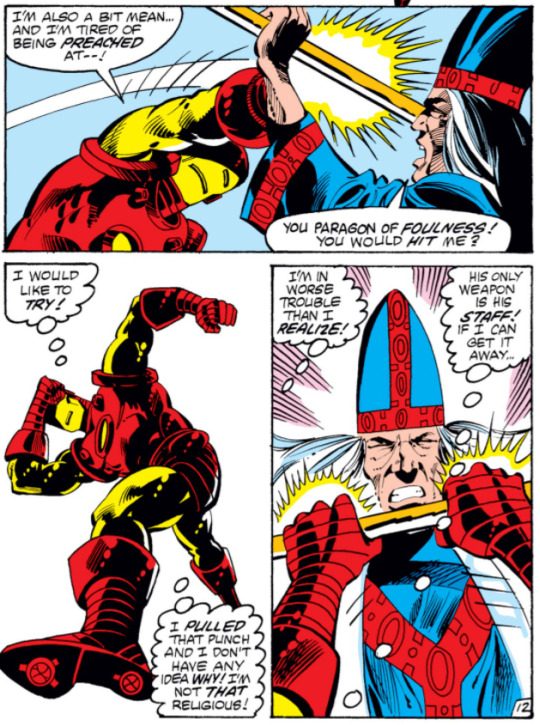
Of course, we could dismiss this as yet another thing that early canon imposed on a character who wouldn’t be like that at this point in time, but I think it brings up interesting beats in the way Tony’s character has progressed over the years.
Considering him as someone who may have been raised as traditionally religious makes sense in the context of defining events, as well, given that we watch him pray the Lord’s prayer in #14 of Iron Man Vol. 4, one of his Civil War tie-ins.
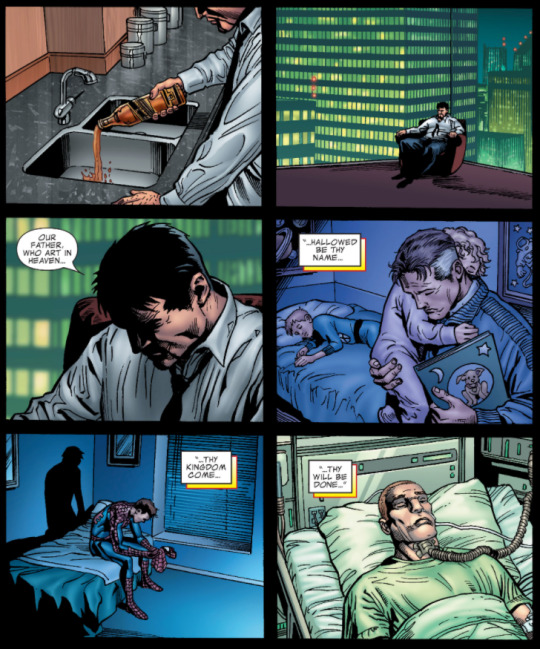
Given the proximity to the alcohol (and the point he’s at in the timeline, here), one could also easily assume that even if he had no religious background, the very presence of the Lord’s prayer in AA meetings could have formed a connection in his head between this “worship” and sobriety-- at the very least, enough of one that the prayer strengthens the effectiveness of his willpower. It seems the little push he needs to pour a drink down the drain is borderline Pavlovian.
There’s actually a lot of religious imagery in Tony comics in general. He’s a man with a suit facing conundrums of cosmic proportions. It’s difficult for him to keep rationale exclusively within the range of earthly probabilities.
Point is, his atheism doesn’t come from his disbelief in a higher power. It’s quite the contrary, actually. His atheism comes from a belief that there’s no single entity that could claim the title of God, that any being willing to try has, just by being, already forfeited the title.
Which is a fair assessment to make, given that he’s fought many people claiming to be Gods, and they’ve all bled. He’s also watched people worship Gods that turned out to not... really be Gods, whether they were otherworldly beings, his buddy Thor, or, uh, himself. The idea of him, at least. In space.
Because of course that happened.
But Tony actually does have a higher power to give himself up to in these meetings. In Civil War II #1, he very explicitly states it:

“I respect the future. I believe in the future. I worship at its feet.”
“The Future” to him is something he can affect, certainly, but he’s aware of just how massive it is, just how massive all of time is compared to the few decades he’ll spend on earth. This is his higher power, his cosmic deity of choice.
It can’t bleed. It can’t falter. It’s inevitable.
And this mindset is... pretty in line with everything else he’s done. He’s referred to himself as a “necessary monster.” He’s implied many times over that he thinks he’s rotten and potentially dangerous, but he’s also intelligent and capable and he wants to do the right thing, even if he doesn’t always know what that is.
If you’ve ever been in a religious environment, you’ll probably recognize his mindset going into any problem: there’s always a solution, always information he’s missing, always a “right choice” he’s looking for with a domino effect that’ll be as favorable as possible for future generations. He trusts in the future the way people trust in God, with an awareness that he’ll never have all the pieces to make sense of everything, but he can have enough information to act. And he must act, or else his worth, his right to be alive, even, is at stake.
So, needless to say, he’s not praying to a mainstream God. But religious imagery isn’t and has never been off-putting to him, and though he certainly could seek out unreligious (is that a word?) alternatives to AA, I find it hard to believe that he would, given just how influential his higher power of choice is as it guides him through life. He puts everything at stake for it, going so far as to make choices that will destroy not only himself, but also his relationships with his loved ones if it means he’s doing what he perceives to be the right thing.
Secondly, even if he were a man who had no belief in any form of higher power, not even a stand-in for it, AA still might not be something he’d discard in favor of an alternative.
Religion serves as a guide. Most often, it has “do”s and “do not”s, certain beliefs it supports, and a kind of... basic explanation of what human life is and how it should be treated. One of the more common threads among most religions that I’m aware of (I am not an expert in religious studies; please don’t @ me) is the idea that human life is generally sacred, and as such, people should treat each other with respect. Yes, some texts can contradict this, but the general rule is “be nice to each other!” when you really look at the basics of what people are trying to teach. At its core, religion is linked to what we as humans already tend to for the sake of survival: compassion.
As such, though we might not always identify with religion as a concept, it’s not difficult to identify with some religious morals and teachings. Some people take to certain teachings better than others-- it’s super case-by-case-- but if you’re stuck in a religious environment listening to some preaching or anything, there’s probably going to be something you can relate to, and some way you can morph and adopt the message. This isn’t, like, all-encompassing, by the way. Of course there are some things that atheists and religious folk will never be able to relate to within each other, but.
You get what I mean.
I’m an atheist myself. I spent a chunk of my schooling at a religious institution. At best, there were messages that affected me deeply (as they were hard-hitting even when I stripped them of the God-worshipping aspects). At worst, I had to grit my teeth through some assignments, though I felt mostly indifferent (if slightly resentful at times, more out of frustration with the closed-mindedness of the administration than with the concept of religion itself). My experience isn’t universal, of course-- some people in my shoes were more frustrated and angry than I was, and I can see why. But my point is, being an atheist in and of itself (even one as strict as Tony) doesn’t render religious imagery useless.
For example, if you happen to pass by a pastor preaching about struggles with guilt, you might not identify with the sentiment of “Give your worries to God and know He’ll take care of you.” However, you could identify with the sentiment of, “Those little things, those side effects of decisions you’ve made? They’re here. Those decisions have been made. You’re allowed to swallow past the reality of what it is that’s passed and move on. You’re allowed to let go of it, so long as you’re better today than you were yesterday.”
It’s especially easy to do this if you’re listening to or being exposed to content from a religion you’re already familiar with; in Tony’s case, if we assume he was a Christian at one point or was raised with Christian ideals (not unbelievable in the slightest, given his circumstances and upbringing), then he wouldn’t have to do a lot of heavy lifting in order to get to “core messages” of certain Christian teachings that he could still identify with. Couple that with the higher power mentioned before, and... it’s not hard to see what might be appealing to him about AA, and it’s not hard to see why it was so effective at sticking in his mind all the way through his darkest periods in life.
Now comes the less healthy part.
There’s also an aspect of self-flagellation to it that I feel Tony might identify with on a deeper level. We’ve seen him hate himself openly, and we know how he regards himself. Even if he managed to find himself in a courthouse-like environment where the religious undertones were more about judgment than recovery, I don’t know that that would necessarily... push him away? He’s already told himself there’s something rotting and evil at his core many times over. He’s already committed himself to a lifestyle of atonement and progress, punishing himself when he fails to accomplish things no human reasonably could and barely praising himself when he doesn’t fail. Do I think these kinds of meetings would be totally sustainable for him, given that he clearly needs to feel pride or relief on some level for conquering his demons? No, not really, but. I don’t think he’d abandon them straight away.
Besides, every healing environment he’s been shown in has been more on the welcoming, open side, even if we only get to see a bare bones interpretation of AA (with deeper exploration happening more with Tony’s response to it, or his and Carol’s responses to each other) in canon. He’s in a good place with it, and it’s very nice to see.
Tl;dr: Again, great question. At the end of the day, I think the combination of self-loathing, his desire for progress, and his conceptualization of “the future” as his higher power makes AA a good fit for him despite his lack of a belief in "God” as an entity.
#cassks#religion#alcohol tw#the day has come where my quasi-religious background has become useful#if there are parts of this that are illegible... that is my bad#i have. a killer headache right now#and i hurt all over#but thank you for the ask it was very nice
44 notes
·
View notes
Text
The Unforgivable One
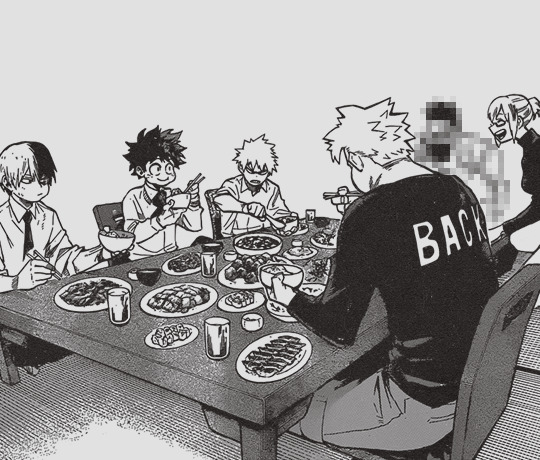
Someone in my inbox accused me of not treating the heroes like “flawed human beings”. However I think they had a fundamentaly misunderstanding of the way I read characters, both heroes and villains. I don’t see people as good or bad. I see everyone as equally human and flawed. Bad people don’t do bad things because they’re psychopaths, they often do these things for very understandable and human reasons. You can often hurt someone for very normal reasons. Abusers are in fact human too, and often they don’t really see themselves as bad people. Most people are not in fact cackling villains but in fact perfectly normal human beings going through mental gymnastics to justify themselves. So with that in mind let’s take a look at the incredibly flawed human being that is Todoroki Enji. Obvious content warning for discussion of child abuse under the readmore. If you can’t stomach it please don’t read this post for your own safety.
1. Endeavor’s Motivations

Endeavor’s motivations aren’t hard to understand, because they’re basically the same as Bakugo’s his foil. This is something the manga itself has commented upon. Bakugo gives us a view into the mindset of teen Endeavor and likely the attitude that led him to becoming the adult he is.
Endeavor is, in a way, as much of a victim of hero society as Bakugo is. In the fact that Enji has been negatively influenced by a lot of the views of hero society. Bakugo and Endeavor both have incredibly flashy quirks more suited to combat and defeating villains rather than saving people which makes them the ideal of hero society’s quirk prejudgice. People are not born equal, that’s the words that the manga start with, and it’s imporatnt to notice that people like Bakugo and Endeavor are heavily favored by hero society but that too comes with its own unique set of pressures. As hero society is ultimately a very toxic system overall that holds up an unhealthy ideal.
Bakugo is a bully, ultimately. He wants to make other people feel small to make himself feel big. Endeavor is the grown up version of that same bully. However, Bakugo while being a bully Bakugo also has an extremely uhealthy mindset where he is constantly piling up pressure on himself and never really feeling satisfied. A mindset which instead of trying to correct Hero society praises Bakugo for having, and encourages.
Let me explain. Basically, Bakugo and Endeavor are both the living embodiment of “damned by faint praise.” They are constantly being praised and told how special they are because of their quirks. However, while this may have been enough for them early on in their lives while they are little kids they eventually get the sense that they haven’t really earned the massive amounts of praise people give them.
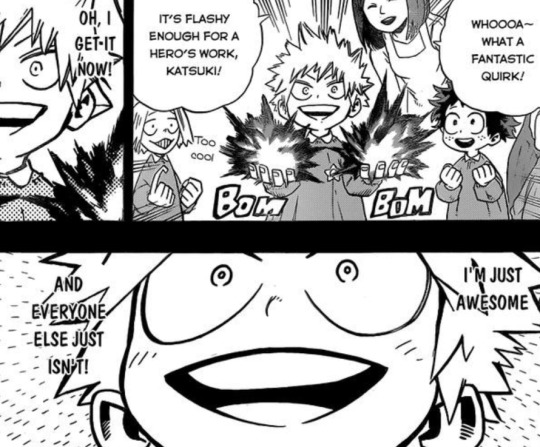
This causes both of them to be struck with a serious case of what most people call “Imposter’s Syndrome”, they don’t really feel like they’re the ones getting praised. They don’t feel like they’ve earned it. This is when one of their first mental traps springs. They decide they have to become the really great person that everyone sees them as. They’re always specifically aware of how short they fall as a hero from the expectations of everyone around them, and they are constantly working to make the difference up.
Endeavor and Bakugo are people who have incredible drive, and also an incredible motivation to improve themselves. This has been stated before by the story several times but none of these are bad traits to have. Wanting to improve yourself. Wanting to live up to everyone’s expectations of you, or even your own expectations of yourself can lead to you pushing yourself to do good things.
However, the problem is for both Bakugo and Endeavor that no matter how much they build themselves up in their head they’re building on very flimsy foundations. Both of them are building towers of sand, or houses of cards. They have a lot of self-confidence in themselves but it’s always fragile. Because they have confidence, but no security in themselves. They are extremely insecure individuals.
They both pile up an incredible amounts of stress and pressure on themselves to be the best, or at least to be as good as they think they should be, but they also both suffer from the two same critical flaws. Number one, they have been taught no healthy ways to deal with this negative buildup of stress. This is once again one of the faults of hero society, if people are strong then nobody around them will ever see them as week.
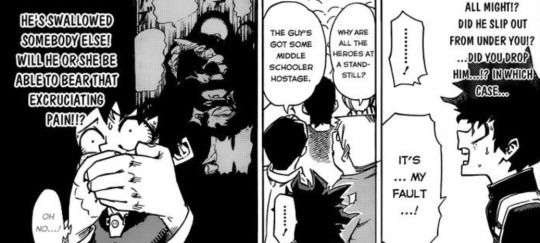
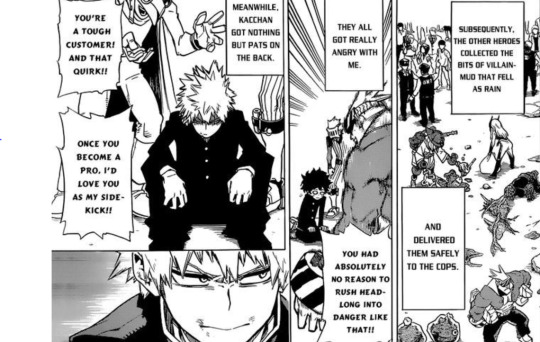
Bakugo is kidnapped by a villain at the start of the manga, not a single person is worried that he might be traumatized from nearly being killed. Of course not he has an incredibly powerful quirk. He’s strong, so he must not suffer from trauma like the weak kids.

Bakugo is uniquely pressured because he has a strong quirk, everyone around him expects him to be strong at all times and Bakugo himself does not allow himself to show any vulnerability. Bakugo legitimately believes that if he was strong enough, he would never fail, never lose. Bakugo basically doesn’t allow himself to be human in any of the ways that count. Bakugo only sees himself but that’s a double edged sword, when things go wrong the fault has to be with Bakugo, it’s because Bakugo was weak. So, Bakugo has been severely emotionally neglected by the institutions around him including UA, which after Bakugo has been kidnapped by several murderous villains did not think to check if a fifteen year old was traumatized and mentally healthy enough to return to classes.
The second flaw in their mindset is that they are continually forced to prove themselves. They work hard, but feel no satisfaction no matter what they accomplish. Even if they have the most resolved cases, even if they get number one in the tournament. This is because once again, the enormous pressure and expectations they push onto themselves. If a Straight A student gets A’s, it’s not extraordinary he’s merely doing what’s expected. If a C student gets an A that’s an accomplishment. Their expectations are so high for themselves that they can literally never be met, and therefore they feel no relief from the constant piling up of expectations and stress.

This is why Bakugo is fundamentally insecure. He’s not good enough to meet his own standards, and it seems like everyone else exists to prove how small he is. Bakugo sees the world as everyone else looking down on him because he’s so stuck in his own head. Bakugo cannot emotionally process this, and because of that at even the smallest upset he starts crying and acting like a child because he just can’t handle these emotions. He’s unstable, mentally always in a very precarious place.
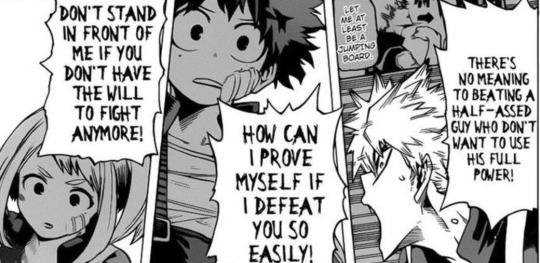
What Bakugo wants is to feel good about himself. He wants to feel like all his hard work is accomplishing something. However, Bakugo’s self esteem comes not from what he’s accomplished but rather that feeling of being better than others, the societal pressure to be the best, which is why he not only has to be the strongest but has to put others down below him. Not only that, but if he feels like somebody is disrespecting him or not taking him seriously then Bakugo even goes as far as to lash out violently. He literally tried to attack an unconscious Todoroki (who was holding back due ot having flashbacks of his father in the middle of a fight against Bakugo... hmm, i wonder why). Bakugo’s mindset is very insular. Bakugo just kind of assumes that everybody thinks exactly the same way he does, because he’s not emotionally intelligent really to understand other people. So he just assumes Todoroki holding back is an intentional insult against him and gets angry. In Bakugo’s mind it’s justifable to be violent against an unconscious Todoroki, because Todoroki’s the one intentionally provoking him and looking down on him.

Bakugo and Endeavor go through a similiar arc. They both build these giant towers on foundations of sand, only to watch them crumble and be left with nothing. They both realize that they were fighting for the wrong thing all this time.
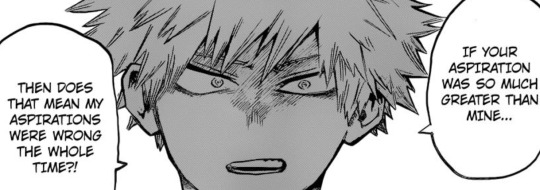
When they realize they were fighting for the wrong thing, all they can feel is emptiness and their own personal disatisfaction. Bakugo and Endeavor were chasing something they were never really going to have in the first place, because even if they became the number one hero, even if they were the strongest in the world it would never be enough for them. Which means they’ve accumulated all this stress but have no healthy way to deal with it so they vent it out. Literally the only thing Bakugo can think of to do when he’s at his limit is beat up Deku one more time and try to make himself feel strong again and prove that his way of doing things wasn’t wrong.
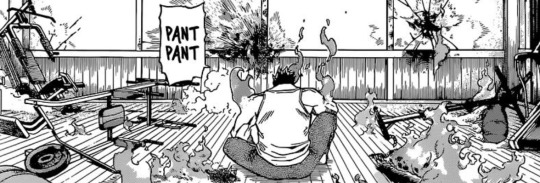
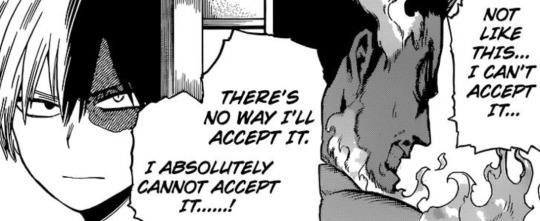
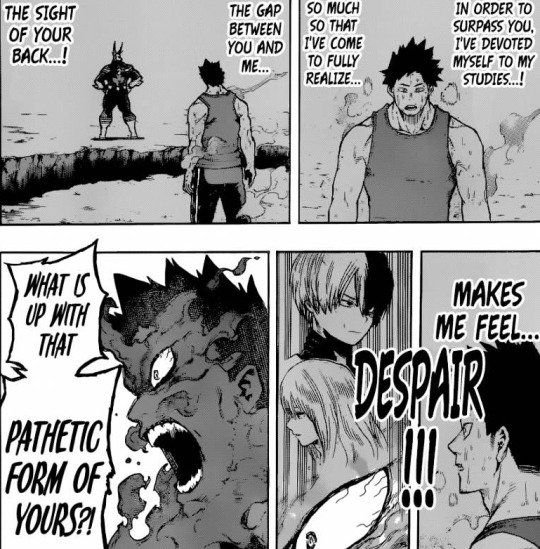
Bakugo and Endeavor find themselves at similiar points. They both realize everything they were devoting themselves for was wrong from the start, and they were never going to get what they wanted out of life. While Endeavor’s reasons are not necessarily sympathetic, they are at least understandable and human. Endeavor feels like he’s owed a reward for all of his hard work. He wants to feel like he’s someone special and important. Endeavor and Bakugo are selfish yes, but a selfish drive doesn’t have to be a bad thing necessarily. Endeavor and Bakugo are always pushing themselves to be the absolute best version of themselves because they believe in society’s pressure to be the best wholeheartedly. They’re also continually made to feel worse than everyone around them. Their tremendous egos are actually fueld by very small insecurities.
They also much like human beings don’t absolutely think they are right all the time. Bakugo and Endeavor both have hit their limits so to speak. Their struggles are sisyphian. They push the boulder up the hill, watch it roll down, push the boulder up the hill, watch it roll down and are slowly realizing that all of their struggles are getting them absolutely nowhere. At which point both of them begin to self reflect and think they may have been going about things all wrong from the start. Bakugo and Endeavor both have some awareness of how unhealthy their mindset is, or at least that it’s not getting them what they want. They are sometimes capable of questioning themselves and where they’ve gone wrong.
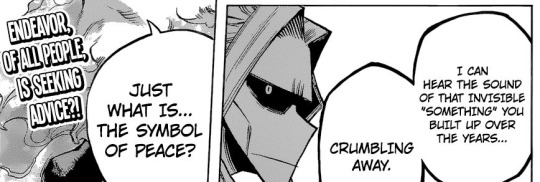
2. A Show Parent
Psychological projection is a defense mechanism people subconsciously employ in order to cope with difficult feelings or emotions. Psychological projection involves projecting undesirable feelings or emotions onto someone else, rather than admitting to or dealing with the unwanted feelings.

Endeavor is constantly battling with his own feelings of inferiority in weakness. However rather than process these feelings in healthy ways, Endeavor has always chosen to take his feelings out on his family. The reason why is because from the start Endeavor has viewed his family in a selfish way, they existed, and continue to exist for him and not the other way around.
The way Enji projects on his family is actually for pretty common every day reasons. Enji himself feels like he can’t achieve what he wanted out of life. He wasn’t good enough to become number one, he couldn’t hack it and therefore he’ll never be good enough. That’s why he made the decision to instead try to live vicariously through Shoto, who he sees as an extension of himself. Enji has projected all of his wants and desires entirely onto Shoto. When he was raising Shoto, it was never about having Shoto’s needs met, but rather what Enji’s wants were.


Enji feels that he himself is not good enough so he projects himself onto Shoto to accomplish what he can’t, belcause he thinks he will be able to find the fulfillment he’s seeking that way. It’s the same as a person with dreams of becoming an actor pushing their child onto the stage at young ages instead of letting them go to school with all of the other kids. It’s the same as a person who wasn’t able to achieve their dreams in sports pushing their kid to be good at sports. In that sense Enji is not Todoroki’s father, he is his coach, or his manager. He’s not responsible for taking care of a child he’s raising them for a purpose.

This is the reason why we see Enji get physically angry at Shoto. Enji has so thoroughly projected himself onto Shoto, that anything Shoto wants outside of what Enji wants, Enji perceives as resistance. Enji does not seem to get that a five year old can’t take the intensive training because he sees himself as that five year old. He thinks that Shoto must just not want it enough. That he’s not motivated enough. That he’s resisting him purposefully. It’s the same reason as Bakugo getting violent towards the unconscious Shoto near the end, when Shoto stopped fighting him seriously Bakugo in his fragility perceived it as Shoto holding back from him on purpose because he was looking down on him.

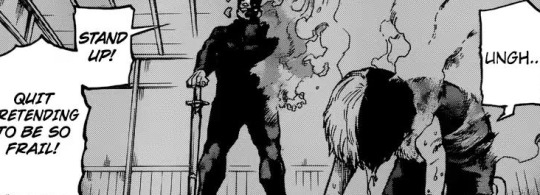
If Shoto succeeds then Enji expects to feel that success. If Shoto fails that means Enji is not only reminded of his own inferiority again, but he also is forced to relive his lost dreams. Shoto doesn’t know any of that though, he’s just Shoto, just a kid, so of course he’s going to fall short of Enji’s extremely schewed expectations which is where the negative feedback loop beings.
Because, even though Enji is using his family to try to make himself feel better that doesn’t work either. The truth is Enji can’t live vicariously through his son. Shoto’s success is not his success, and Shoto himself even wants nothing to do with him anymore. Enji has been using his family for completely selfish reasons up to this point and we reach a point in the narrative where Enji at least seems to grasp the fallout of his actions. Enji is at least aware of the fact that his family doesn’t like him, and that he’s done a bad.

Reconciliation and calm are both stages that are written into the cycle of abuse for a reason. Most abusers are not heartless monsters, but rather humans. The frightening thing is abuse is a very normal thing, that arises from normal circumstances. Almost anybody can become an abuser, because it’s an abuse of power, it’s a cycle people get trapped in. A lot of abusers realize that what they are doing is wrong, this is called th reconciliation stage of abuse. Most people do in fact feel bad about it when they hurt another person and want to make ammends.
The reason abuse repeats however is because the core behavior does not change, and the power dynamic remains in place. Abusers apologize for the wounds they caused, but don’t really address the problems of their behavior on a deeper level, and because of that they let the tensions build again and another incident always occurs.
So what we are seeing post All Might retirement is not really a change in Enji’s behavior, because the core of who he is remains the same. He has perhaps had a change in motivation, he’s realized that trying to be the number one hero is never going to get him what he wants, and the way he’s treated his family has made his family hate him. However, he never addresses the core of the issue which is that he thinks his family exists for his sake. This is not my analysis these are things Enji has literally said, not in the tournament arc but post Kamino. Endeavor still says I’m going to leave everything to Shoto. Not even asking what Shoto wants to be. He still sees Shoto as his heir who exists to carry on his legacy.
Enji is still essentially doing exactly what he did before and expecting a different result. He even says so to Shoto, if he’s a good enough hero, then Shoto will watch him, and be proud of him. These are Endeavor’s own selfish motivaions and not what the other people around him really want him to do. He’s doing this for the acknowledgement he thinks he deserves, and the attention from his family he thinks he deserves and not really for altruisitic or heroic reasons.
Enji repeats a lot of his behavior from before. He still piles attention and attention onto Shoto that Shoto does not want. He is still essentially projecting himself onto Shoto and the rest of his family, that behavior has not changed, it’s just his method. He thinks if he becomes number one dad now instead of number one hero that will get him the sense of accomplishment he craves. The problem is underneath all of his actions, Enji has yet to really grasp what he did wrong. He doesn’t grasp how selfish his actions are. He doesn’t seem to understand how messed up it is, that he seems to think his family exists for his sake. He found a wife, he had children, he had Shoto, not because he wanted to make a family happy but because he wanted to use them to further his own amibtions to become a hero.
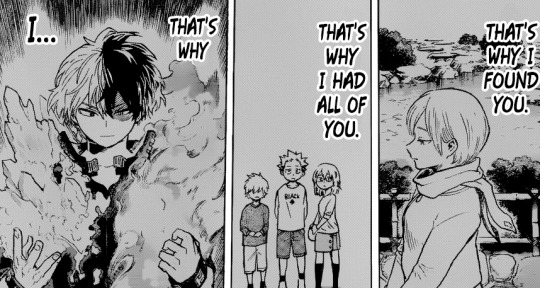
Enji is both capable of realizing that he hurt people, and feeling genuine remorse fo his actions but also not really making any signficant changes for his behavior. The fact that both of these can be true simultaneously is what allows abuse to continue.
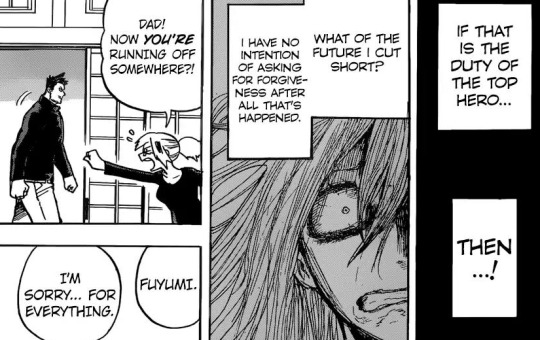
While he knows he did something wrong you also get a sense he doesn’t truly understand how truly heinous some of his actions were. Enji always has this narrative inside of his head that he simply made a mistake somewhere along the way, that he acted without even realizing what he was doing.
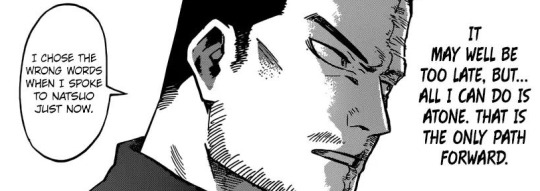
It’s not that Natsuo is angry with him and will never stop being angry with him, it’s that Enji has somehow said the wrong words by mistake. It’s not that Enji violently beat a child because he was angry that child wasn’t living up to his impossible standards, but Enji somehow just ignored Shoto’s wishes.


He always makes it sound like it was accidental, like he didn’t know what he was doing, like he somehow didn’t mean to abuse them. He wasn’t beating up a little kid he just ignored Shoto’s wishes and it somehow went wrong along the way. This complete lack of culpability that Enji has towards his own actions is also what leads him to repeat several really bad aspects of his behavior, such as hyperfocusing on Shoto to the point of ignoring Fuyumi and Natsuo, forcing Shoto to live up to his legacy and accept his help, still vicariously living through Shoto instead of letting Shoto be his own person.
Enji doesn’t address the root cause of the behavior and doesn’t change himself in any real way. The bad behavior repeats. The cycle continues. What Enji has been avoiding and what he needs to acknowledge is that there was genuine malice in the way he treated his kids. He sees his whole family as existing for his sake, to meet his own emotional needs and when they failed he always took it out on them.
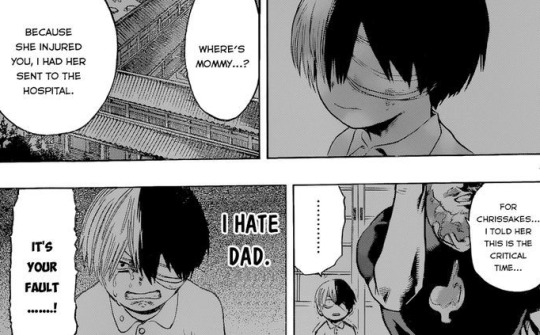
For Enji it’s always Enji first and everyone else second. It’s always primarily about what Enji wants. He doesn’t seem other people, only himself, and what he wants. That’s why when Shoto literally has half of his face burned off as a result of Enji’s actions, all Enji really cares about is that it’s going to interrupt Shoto’s training.
Whenever Enji’s family existed outside of what he wanted them to be, or got in his way in any significant way he always vented his frustation on them. He resorts to hitting for the same reason that Bakugo always feels the need to bully Deku. A grown up bully. Enji needs to make others feel small to feel assured of his own bigness. Deku has to always be underneath Bakugo, otherwise Bakugo’s worthless. Enji has to put his family back in their place. If they resist or show desires of their own otuside of what Enji needs for them he turns violent to try to force them back. It all arises from an incredibly unhealthy way of viewing himself and his own emotions yes, but it’s also something that other people suffer the consequences of.

His family exists for his sake, which is why he’s at the same time both extremely controlling of them, but also just straight up ignores the ones who aren’t useful to him.
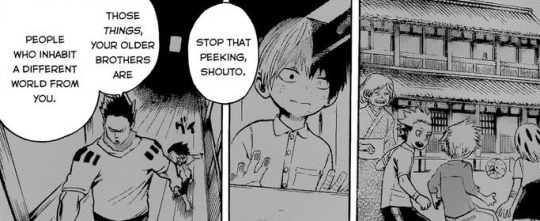
These aren’t a result of Enji going too far, these are all intentional cases of neglect. Especially if you consider the way Natsuo and the others were treated. Enji didn’t even bother to take care of them and raise them as his children because they weren’t of any use to his ambitions.

He straight up had no presence in their lives whatsoever. These are things he intentionally chose to do. For his own selfish reasons, because he thought his children existed for his own happiness and not the other way around that he was not responsible for his children.
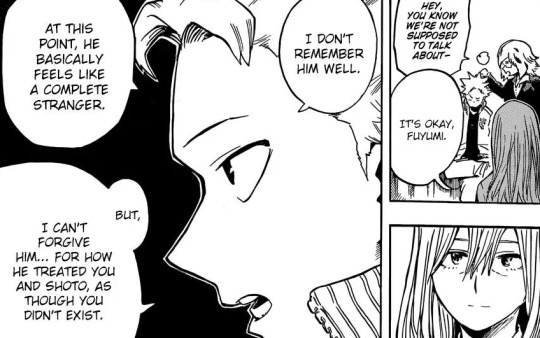
These aren’t things that can happen on accident. Neglect is as much of an abusive behavior as what was done to Shoto. It’s a parent failing even their basic responsibilities as a parent to be present and around in their child’s life.

Even the children he neglects he still controls though. When Natsuo’s cooking wasn’t good enough, Enji forced him to stop cooking anymore.

Enji had to have intentionally does these things, but when confronted with them he always acts clueless. He even claims to Natsuo’s face it was never his intention to shut any of them out of his life, even though he literally says on panel in the past that Shoto shouldn’t pay attention to his siblings because his brothers were failures.

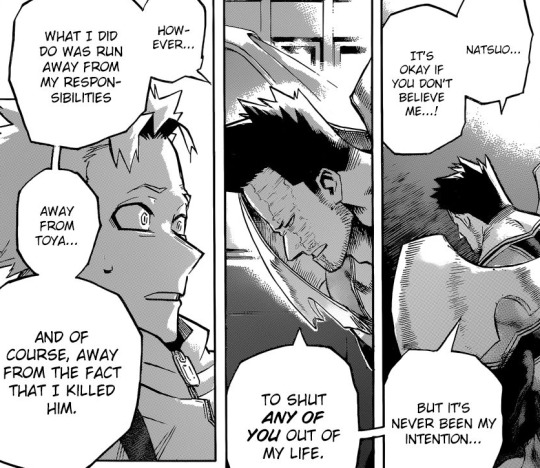

He’s even referred to his other children as things like Shoto is somehow different from them. So how can both of these things be true at the same time? Enji had to have chosen to done these things to intentionally neglect his family, so how can he claim he never meant to shut them out of his life? How can Enji both get genuinely hateful of his children, especially Shoto when they don’t act the way he wants them to, and yet also want to do the best for his family? How can he be completely absent in Natsuo’s life his entire life and yet claim to have wanted the best for him? How is Enji capable of feeling genuine remorse for his actions and realizing that they are wrong, and still have done what he did? It’s at this point we reach the psyhological excuses. The great many hoops that he’s jumped through and mental gymnastics Enji has performed to justify himself.
3. The Shadow of the Hero
So there seems to be two contradictory sides to Enji. There is Endeavor the hero who stops at nothing to be number one who sees nothing else but his ambition and his burning drive to be better, and then there’s Todoroki Enji the family man who just seems to be sort of awkward, emotionally absent, and not at all present in his children’s lives.
Endeavor is overconfident, short tempered, and also an extremely volatile person who will get violently angry if the wrong buttons are pushed. Enji is very quiet and almost self reflective. As if Endeavor is almost always burning, and Enji is burnt out. We see this same kind of emotional dissonance happen with Bakugo too, Bakugo is either on top of the world at which point he’s firing on all cyllinders and acts like an overenthusiastic angry idiot, or he’s very quiet, withdrawn and tends to dump on himself a lot. It’s important to remember that neither of them handle their emotions in any kind of remotely healthy way, so in Enji’s case it makes sense that when he’s not angry he just becomes kind of withdrawn and empty. A person who doesn’t know how to deal with emotions becomes very emotionally awkward when they’re asked to do anything besides, be angry, or punch a villain.
However it goes to a much more extreme extent with Endeavor. To the point where it does almost seem like there are two people. There’s the much more calmer, and reasonable Enji that he has been showing around his family lately.
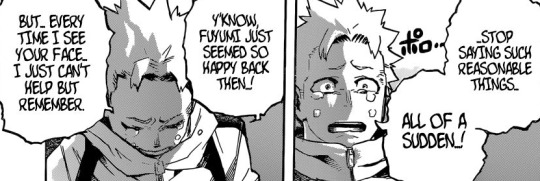
Which even Natsuo says that this change is so sudden and different it’s unnatural. I call this “good behavior” Enji. It’s when he’s restraining himself and holding himself back because he has at least realized that a lot of his interactions with his family in the past were wrong. But good behavior once again doesn’t necessarily mean a change in one’s self, because as stated above there’s a stage in the cycle of abuse specifically for when the abuser starts acting better for a period of time.
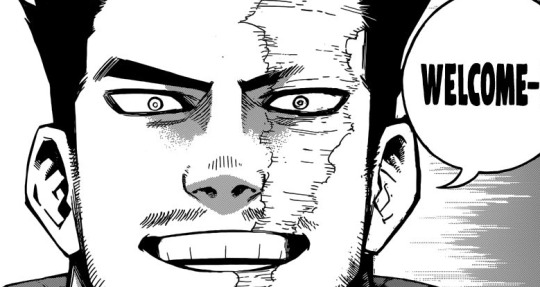
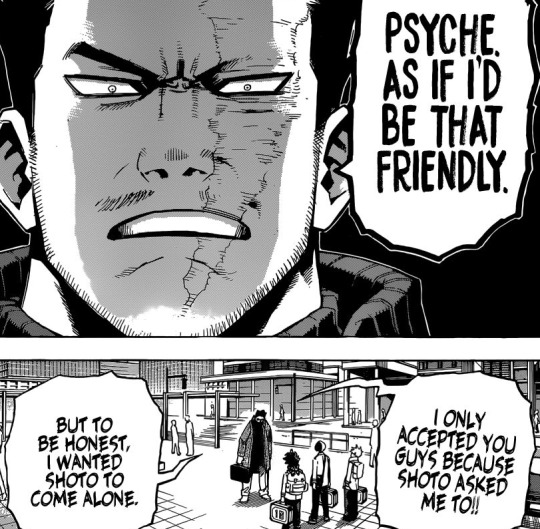
There has always been two faces to Endeavor. Not only does Endeavor see himself that way, but that’s also the way the public in general reacts to him. There is Endeavor the hero, and Enji the person. Shoto even comments on this word for word, that he knows Enji is a very respectable hero especially to the public but that doesn’t cancel out a single thing he did.
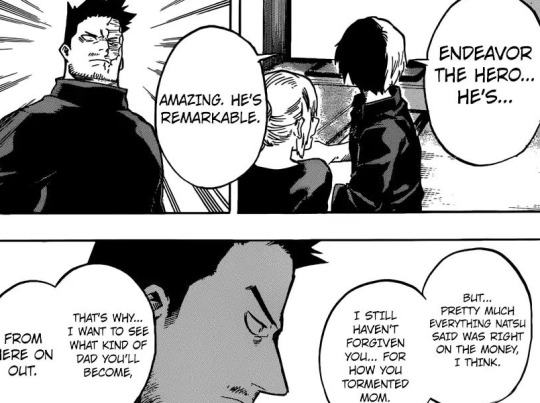
This is where we get into the psychological excuses. Enji’s arc deals with heavy Jungian themes, specifically that of the shadow.
In Jungian psychology, the "shadow", "Id", or "shadow aspect/archetype" may refer to (1) an unconscious aspect of the personality which the conscious ego does not identify in itself, or (2) the entirety of the unconscious, i.e., everything of which a person is not fully conscious. In short, the shadow is the unknown side.
Because one tends to reject or remain ignorant of the least desirable aspects of one's personality, the shadow is largely negative. There are, however, positive aspects that may also remain hidden in one's shadow (especially in people with low self-esteem, anxieties, and false beliefs).
For Enji, his conscious personality is Endeavor the hero. That’s the one everyone sees and reacts to. However, his shadow his the actions he’s done to his own family, what he keeps hidden and concealed from the world. The things he refuses to acknowledge such as how selfish his actions truly were.
Enji has a narrative for himself where everything he did was just because he wanted to be the best possible hero he can be. Even though his actions are entirely selfish, he’s convinced himself that he’s doing these things for Shoto, for his family. The problem is Enji’s entire identity is so focused around being a hero that he doesn’t really have an identity, or much of a personality outside of his career as a hero which is why he’s so underdeveloped as a person. Being a hero is his life. He doesn’t see the parts of his life that don’t relate to his career as a hero.
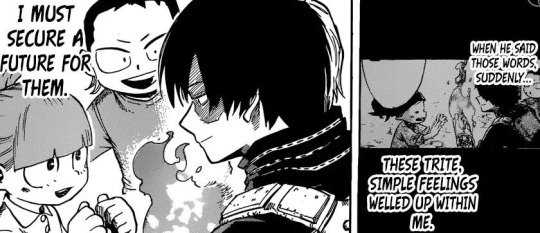
He’s able to ignore the selfish aspect of his actions. All of the contrdictory parts of his actions because he’s in denial. He still sees himself as that hero who wanted to be number one. He thinks everything he did was in favor of that and he just messed up along the way. It doesn’t occur to him that he had geniune malice towards his children, or his family because he chooses to ignore those inconvenient points of his psychology.
Enji is, two people in a sense. It’s because he revolves everything in his life around being the best hero he absolutely can be, that he doesn’t see how his actions are downright villainous. Enji is essentially trying to have it both ways. He thinks he can become the best hero that he can be, and also the best dad at the same time.
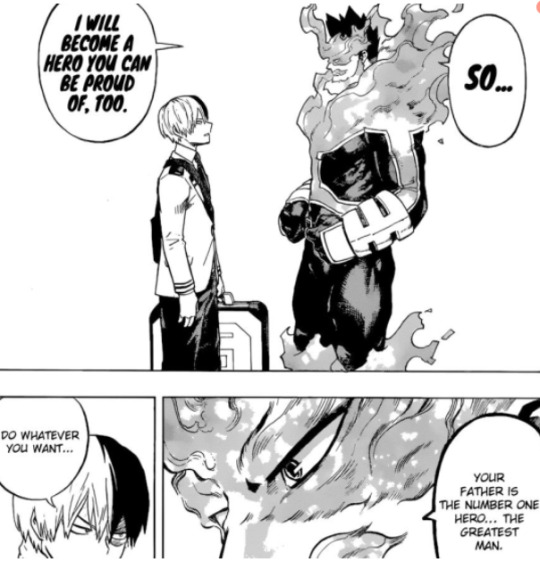
However, his behavior is the same. He’s not trying to prove himself as a father not really, he’s just doing the same thing he always did which is put his job as a hero above everything else. Enji is just so completely in his own head, so in denial of his own actions that he just doesn’t see these things.
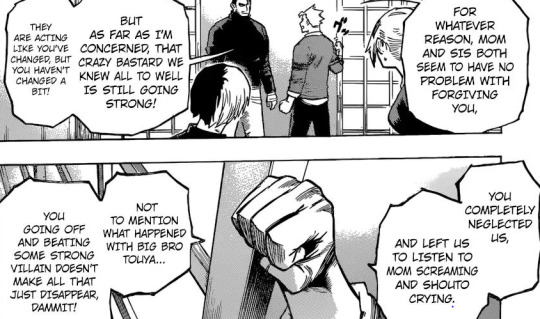
Enji’s actions are a shadow that have escaped from him because his way of atoning and fighting against his past actions is to just do the same thing he’s always did and try his best as a hero. Even though being a hero is literally what caused him to abuse his family, and Natsuo and Todoroki have both pointed out several times that being a good hero doesn’t really atone for what he did in any real way.

Enji’s narrative for himself is that his attempt to be number one was a good thing. That his striving to be the best hero he could be was a good thing. It just somehow got bad results for him. He doesn’t really understand how he got to point A and point B, and part of that is again society’s image of Endeavor the Hero is pretty messed up too. Everyone around him praises Endeavor for being a hero while absolutely nobody talks about what happened in his home life and therefore Endeavor faces no real consequences for it.

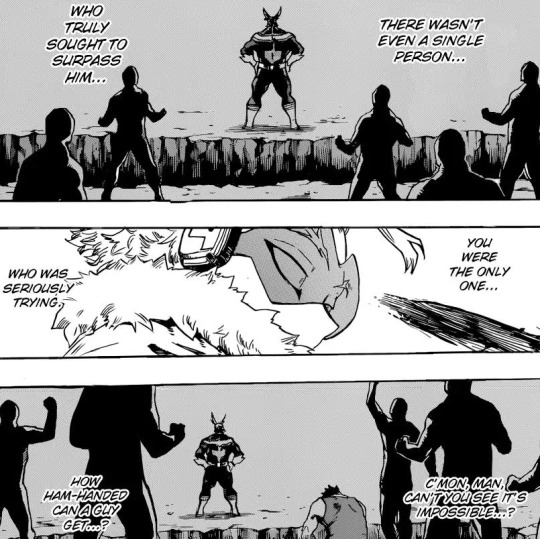
Everyone sees this heroic figure out of the image that Enji projects. Because that’s the light. That’s who he is on the surface. If you look on the surface of his actions only you just see a guy who doesn’t know how to give up, and was trying his best to be number one. It almost looks heroic to see his struggle. However, once again if you only view things from the surface you can’t really understand him or his actions. Which is why Endeavor only viewing himself as Endeavor the hero misses his own shadow and what he’s done to the other people around him.
The person who Endeavor thinks he is, and who Enji really is are two different people. This is because of that unacknowledged shadow. It’s because Endeavor has this huge selfish element to his actions that he’s just completely in denial of. Not because he doesn’t feel guilt for his actions, but because he does and he’s avoiding it.
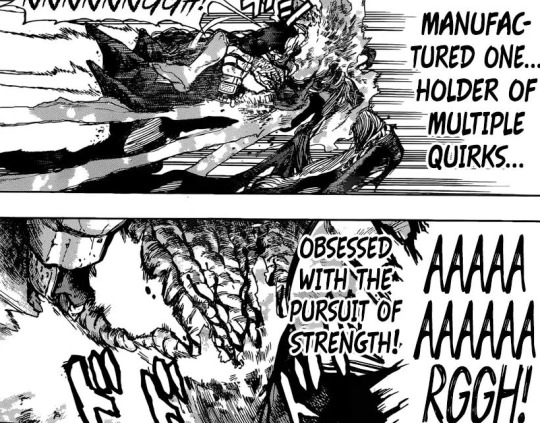
Enji sees himself in the high end Nomu he struggles against, but even that is an incorrect viewing of himself. Nomus are victims, ultimately. They were people who were kidnapped and had multiple quirks loaded into them in the name of mad science. The Nomu is Todoroki, Enji is Ujiko. He’s the one who created several children trying to mix quirks together for his own purposes and then dodged responsibility for that for years. He’s not the monster, he’s Doctor Frankenstein himself.

Enji when confronted with these behaviors, with the absolute worst of his personality, and the dark sides of all of his intentions never acknowledges them. He never tries to integrate them into who he is as a person. He just tries to fight against them and defeat them.
“Unless we do conscious work on it, the shadow is almost always projected; that is it is neatly liad on someone or something else we do so we do not take responsibility for it.”
Robert Jonson
You don’t destroy a shadow. You don’t make the bad things you’ve done and the bad parts of your personality go away. The only way to defeat the shadow is to integrate it and consciously acknowledge that you are like this. This shadow stuff is not something I’m applying to the text either, the text directly references it.
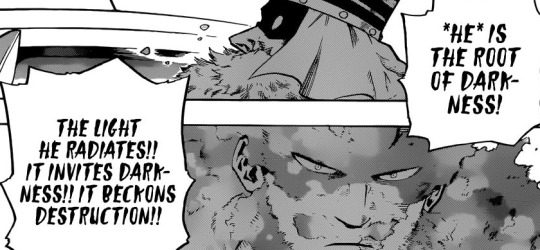
This is Jungian symbolism. The light of the conscious mind creates the shadow. It’s because people only pay attention to Endeavor that hero, that his shadow Enji the person becomes thicker and blacker. The longer people go without acknowledging it, the darker his shadow will become.
Which is why Dabi is in a way his shadow as well. The violent parts of his personality that Enji has failed to acknowledge or do anything about, part of Enji that still believes that the only thing that matters is strength.
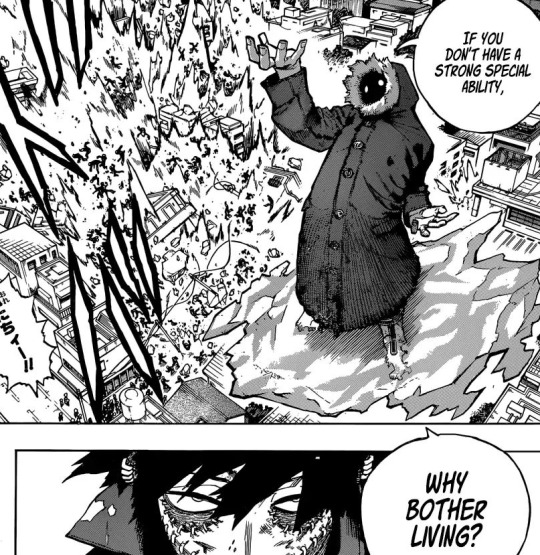
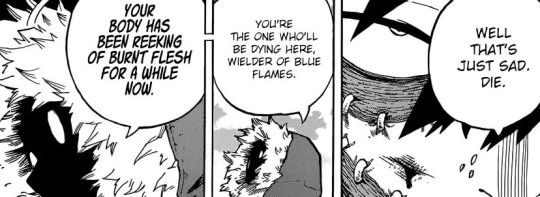
Enji would never approve of Dabi’s actions, and yet Enji also created Dabi. Once again think of frankenstein and the monster. Dabi wouldn’t even exist if Enji had never abused his family. The monster argues against Doctor Frankenstein that yes he has murdered people, but he never would have existed in the first place unless the doctor had created him which manes the doctor shares respsonsibility for even the unintended consequences of his actions. A person is responsible for their shadow, intentional or not. Dabi is the shadow of Endeavor’s actions in human form.
He exists to bring into conflict what Enji has been ignoring. That he can’t be good to his family and be a good hero at the same time, because his drive to be a hero was the source of his abusive behavior in the first place and drove him to do what he did to his family.
Enji is a very selfish person who hasn’t confronted his own selfishness in any significant way. Do I care that he’s only atoning for selfish reasons. No, that’s not the problem exactly. You could argue that all atonement is selfish in nature. The fact that Bakugo and Enji are very self-driven individuals is not necessarily the problem, it’s not a bad thing to want to be selfish, or even desire to better yourself. It can lead to good things. It’s that in Enji’s case, his selfishness always comes at the expense of others. He completely shuts people out and doesn’t even see them. All he sees is what he wants to see. Above all else this viewpoint of the world is very narrow and self-serving. He only sees the surface of his own actions. He only ever sees himself as the hero and can’t acknowledge that to his family he’s the villain.

Enji only ever saw himself and his self-centered view of the world, and everybody else, including the children he was responsible for and the wife he forced a marriage on only ever got in his way, which is why he resented them. If Enji wants to atone that’s one thing, but if Enji wants to stop being such a selfish person and truly do things for the sake of his family as he’s stated he wants to in the past that means acknowledging his actions.
Enji continues to be a hero because that’s what he wants, it’s what he’s built his whole life around. He even sees his path forward to atonement as just continuing to do his job as a hero, even when he’s told by Natsuo that won’t work. Which is why the only real substantial way for Enji to change is to actually have to give something up. To acknowledge that he’s in fact a bad hero. He even stated himself, there’s something he wants even more than being a hero now. He wants Toya to be there.
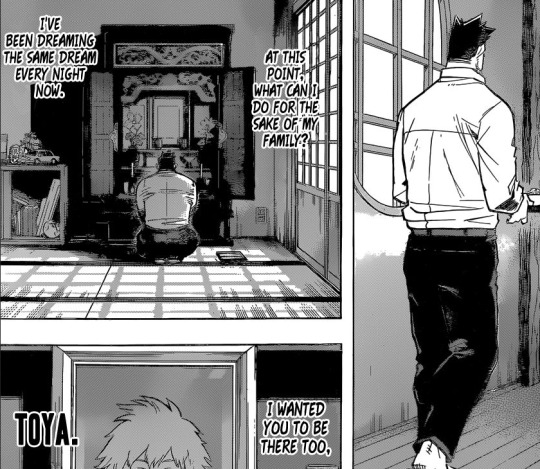
Which is why Dabi is such an important character because he not only forces Enji to realize the worst of his actions but also to choose, between what is best for himself and his career as a hero which is the only thing he’s ever really cared about and what is best for his family. It’s only in the confrontation with his shadow that we can see what Enji is really made of.
#todoroki enji#endeavor#meta#mha meta#my hero academia meta#bakugo katsuki#todoroki touya#foiling#dabi
482 notes
·
View notes
Text
Chapter 3-Project “Ma” –Adam–; Scene 6
Original Sin Story: Crime, pages 108-115
There were no complaints about Adam becoming the new director from about the ten other researchers there.
Adam’s knowledge and ability from being raised under Horus’ tutelage from a young age was something everyone had already seen for themselves.
Around this point Adam himself had developed an interest in the legacy pieces that were so filled with mystery, and even came to enjoy researching how to better use them.
But at the same time, he was also dejected that these would become tools for political conflict among those with authority.
Did Father feel the same way? Adam thought to himself.
The truth that Horus had told Adam before he left.
I’m…the son of the queen…
It continued to smolder in the corner of his heart.
.
One day, the man named Gammon who was head of the peacekeeping force visited the institute.
“I’m seeking Sir Horus’ whereabouts,” Gammon informed Adam.
Adam looked at him doubtfully. “I hardly think that’s the job of the chief of the peacekeeping forces. And my father left on his own, looking for a place to die.”
“Are you saying it’s uncouth of me to deliberately seek him out?”
“Yes. And he’s probably already…breathed his last.”
“If he’s dead then at the very least I want to have a proper mourning service for him, so that he might rest easy.”
Gammon’s reason for persisting on the matter with Horus—Adam knew quite well.
He took out the list of names from the drawer in his desk, and then opened up one of its pages to show Gammon.
--And then the other man understood everything.
“So you know. Of the relationship between Horus and I.”
“You were plotting with my father to start some kind of anti-government coup. I imagine it would be quite unfortunate for you if that went public.”
Even moreso considering Gammon was not only the head of the peacekeeping force but also the son of the senate head.
“Are you trying to threaten me?”
Gammon glowered at him, but Adam shook his head with a smirk.
“As-if. The existence of this list isn’t terribly convenient for me either.”
If the senate were to learn of his father’s true nature, it could very likely spell disaster for Adam.
Gammon seemed to grasp this, but he still showed no sign of relaxing the tension on his face.
“…Then I wonder which side you plan to stand on? Will you take on Sir Horus’ will, or—”
“Frankly, I haven’t decided yet. I did respect my father, but at the same time I also hated him. And there are…several things to consider, for me personally.”
“…?”
“Well, let’s try to get along, for now. Perhaps this may end up to be mutually agreeable for us both…Ah, would you like some coffee?”
Gammon wordlessly nodded at Adam’s suggestion.
.
Adam and Gammon would meet up from time to time after that.
As they moved ahead in their interactions, Adam came to learn more and more what kind of man this Gammon Loop Octopus was.
Despite being the eldest born son of the Loop Octopus family, as he was magically impotent he had been shunned by his father, and ultimately cast out of his inheritance.
Even so he tirelessly studied guns and swordsmanship, and managed to rise to the rank of chief of the peacekeeping forces.
However, at present it seemed he couldn’t hope to get any farther than that, after all…
More interestingly, despite being unable to use magic he had been born possessing a strange ability.
“—Every so often I see dreams. Purple dreams,” a red-faced Gammon had blurted out while they were drinking wine together at a bar. “And whatever I see in those dreams will come true a few days later.”
“Wow, so you’ve got prophetic dreams.”
“I guess I have the power of being an ‘Inheritor of Rahab’…To tell the truth, all the people of the Loop Octopus family have it to some degree or another—You know what that means?”
“Nnope…”
“The queen has her position by hearing the ‘voice of the gods’, and then telling it to people via a prophecy. But my family can predict the future too, though our methods may differ. In other words—”
And there Gammon drank up his wine, and said to Adam with resolve:
“—We don’t need a queen.”
“…”
So then, this must have been one of the reasons for Gammon’s anti-authority sentiments.
That there was no reason why a man like himself who has such powers…the same power that is needed for the ruler of this country, to be sputtering away at his current status.
He hadn’t declared it outright, but it sounded as though he was plotting to become the king of the country in place of the queen.
Adam hadn’t revealed to Gammon that he was the queen’s son. If he had known that, he probably wouldn’t have told Adam about his theory of her being unnecessary.
Adam was privately undecided on Gammon’s idea, but on the other hand he could empathize with it.
--The person who became ruler should be someone suited to the role.
All the people who live in this land are the children of god…How long would this country be bound by such a hackneyed doctrine?
What had the gods ever done for them?
Give prophecies through the queen?
But what truly saved this country were the devices born out of research into the legacy pieces…In other words, the efforts of the Royal Research Institute.
Wasn’t it time that Levianta took back the correct definition of “kingdom”?
The foundation of a royal family, and inheritance of the position based on bloodlines…
If that could come to pass there would be no more pointless squabbling within the senate.
--Then, who would be most suitable as the ruler of this country?
It would be someone who had had the blood of the current queen flowing through him, and had the most in-depth knowledge of the old artifacts that were so essential to this country…
Yes…me.
It was an outrageously ambitious idea.
There was no way it would go that smoothly, and Adam had no desire to bring about a pointless conflict to get it done.
But if I had the chance—
Gammon clapped Adam on the shoulder as he was lost in thought.
“Oi…You listening?”
“Y-yeah…Sorry. What was it again?”
“’Course you weren’t…This might be a crazy theory, but…” Gammon continued to speak, his tone shaky, “…My family can tell the future too…My Dad, Miroku, is the same. So, even if there were no queen…Even if, say, she’d died a long time ago, then no one would figure it out…”
“…Oh?”
“The queen hasn’t shown herself in public for close to twenty years.”
“That’s…because only the head of the senate is allowed to meet with her directly—”
“My father was the one who decided on that…after he became head of the senate…”
He could just say it was drunken nonsense and think nothing of it.
But if that were the truth…then that would mean that in essence Miroku was reigning over the country as its ruler.
…No, that’s an absurd notion.
His father had said it himself, hadn’t he?
The queen was being controlled with a drug.
If that were really the case, then Miroku would have no reason to kill his mother.
But…either way, the fact remains that Miroku is the one who holds all the power in this country.
He would need to meet with someone who knew the truth.
But Miroku himself would never confess to any of this.
This man here is his son, so maybe…No—if he could, he probably would have done it long ago.
Adam gave a side-eye to Gammon as he lay passed out on the floor from drink.
“Hmm…I suppose I should call it a night.”
Right as Adam put a hand on Gammon’s shoulder to wake him.
“My my. Are you…the head of the Royal Research Institute, perchance?”
There was someone approaching him, speaking up in a jovial tone.
“Yes, I am…--!?”
Adam caught his breath upon seeing this person’s face.
F-father…?
A man who looked just like Horus, who he had thought dead, stood smiling before him.
…But Adam quickly thought again.
This man appeared much younger than the real Horus.
Yes, he seemed about the same age as when Adam had first met Horus—when he had suddenly appeared there on the beach.
“Is there something on my face?” the bespectacled man asked, head tilting curiously.
“N-no…What business do you have with me?”
“Right. I was planning on going up to the institute tomorrow…What luck to run into you here in a place like this. That blue hair…I could tell it was you right away, you have those same features my mentor told me about.”
The man put his hands on his hips, and began his introduction.
“My name is Seth Twiright. I am the top apprentice of Horus Solntse—And the best scientist in this country.”
<<prev------directory------next>>
30 notes
·
View notes
Text
God money breeds god complexes
I didn’t want to overexplain the chapter in the notes, but it turns out that yes, I do want to explore the concepts behind it after all. This is an expansion on the meaning of chapter 108 of The Beautiful Game, which is also known as “Booker’s ending” for the fic, but I have no idea how coherent these musings will be.
What is the point of the chapter? Class conflict!!!! LOLOL Why is this the point of the chapter? Err...because The Beautiful Game is really a musing on life itself? This statement really shows its colors in the final chapters.
Now, what is the class conflict in this chapter?
Merrick: owner of capital accumulated thanks to vaccine patents, owner of the football club that Booker plays for
Booker: an employee at the football club. Don’t be fooled by his massive wages--he’s still an employee on a wage contract.
For all the debate about overpaid footballers, one thing is true, and this is a line Booker said in chapter 64: After all, lord knows they will always find a way to make more money off them than they will ever pay them.
Case in point: the finances of Barcelona FC are a complete mess, and Lionel Messi is on an eye watering wage that reportedly breaks down to over 2 million pounds a week. However, with a deeper analysis, some economists dug up that Messi is responsible for practically 50% of Barça’s revenue:
The player made 383,655,000 euros over the 3 years but he has generated 619,265,000 euros in the same time period. This means that the player has made the club a profit of 235,610,000 euros.
Football almost uniquely illustrates the surplus value equation, which is put forth by Marx as "an exact expression for the degree of exploitation of labor-power by capital, or of the laborer by the capitalist", because labor and product are the same within football--both rest within the form of the football player, whose labor generates the entertainment product that is the football game but who are in themselves marketable products--pieces of the notion of the player is turned into merchandise which can be sold. Further, the revenue-generating potential of a player is quantified into the transfer value, which is a payment made from one club to another to obtain the rights of the labor-product (i.e. the player).
Anyway, what I really mean to say is that the chapter is important for me to include, even though its purpose is very opaque at first glance. I cannot write about modern football without illustrating the capitalist machinations behind modern football.
There’s also symbolism! The mistral is a strong, cold, northwesterly wind that blows from southern France into the Gulf of Lion in the northern Mediterranean, and means “masterly”. Coming from Provence, le mistral is a reference to Booker as a masterly playmaker in the game but...it also portends storms. The chapter also calls into question who is the true master, for which the answer is Merrick, as the owner of capital and Booker’s labor rights.
Booker could not fight against Merrick--but he also isn’t given an obvious reason to in this chapter, although we’ve been told before that Merrick has a very cold approach to his players. Merrick has offered Booker a pay rise, but he’s also totally exploited the fact that Booker turned down a competitor, to offer Booker less money than his fair market value.
And then there’s another very interesting conflict between Merrick and Booker, which is exceedingly European and convoluted to explain, but European class divisions are not formed on the basis of money, but on the basis of symbolic markers (which can be cultivated by money). In polite old-money societies, money itself is crass, and talking about money is the crassest of all.
Merrick LACKS the old-money class indicators, while Booker actually possesses them: this is demonstrated in Booker’s knowledge of wine, which takes Merrick by surprise and causes resentment within Merrick. Booker was aware of this because when Merrick asks him how he knows about wine, he provides a misdirecting answer. Being French does NOT confer any special knowledge of wine. In actual fact, the supremacy of French wine is upheld by the most British of wine institutions: the Court of Master Sommeliers, and the other various British wine and spirit institutions.
The OM academy knew exactly what they were doing when they placed Booker away from home. It’s classism, because they didn’t think a social housing environment would encourage a kid to follow the norms they want to impose. They bumped Booker into a middle class household for him to take on bourgeois values by osmosis. Some of it worked, some of it didn’t. By sheer dumb luck he had a kooky wine-obsessed host dad (As a side note: this is also a pointed callout on the bobo to antivax pipeline)
Anyway, Merrick is a total BoJo type, who is extremely insecure about their class standing (because their pedigree by birth doesn’t cut it, even if their education does), and by virtue of this insecurity continue to inflict immense damage on the world.
Merrick’s resentment of Booker’s accidental display of superior class knowledge leads him to shove Booker over when he senses an opportunity--which is pure schoolground bullying. What Merrick doesn’t know is that Booker has trauma from experiencing domestic violence in his childhood, and this random act of violence was triggering for Booker. It doesn’t matter that Merrick doesn’t know--the effect is the same. It’s an act of banal cruelty, meant to reinforce power relations.
And the end of all this, we roll into Booker’s final line, which is “his tears will not fall on her,” a line that just breaks me in so many ways. From the chapter before I’ve already gone into a whole existential musing on the duties of parenthood, and Booker and Nile are the characters who carry this duty in this fic. I think often to Philip Larkin’s “This Be The Verse”, a poem that resonated so much to me as a teen with a lot of familial difficulties.
This Be The Verse
They fuck you up, your mum and dad.
They may not mean to, but they do.
They fill you with the faults they had
And add some extra, just for you.
But they were fucked up in their turn
By fools in old-style hats and coats,
Who half the time were soppy-stern
And half at one another’s throats.
Man hands on misery to man.
It deepens like a coastal shelf.
Get out as early as you can,
And don’t have any kids yourself.
Now that I’m an adult who accepts my parents have flaws, I think the final verse of this poem bears a pessimism that I’ve learned to work through. I even belive I’ll do a better job of parenting, but if I have to be real, it’s because I am in a place of financial security. If we write for ourselves first and foremost, part of the overarching message of the fic has been to say that there is a better way, there is a way beyond what we know and we may not see the final work but we can build the foundations for the future.
And so I just love Booker and Nile’s final lines so, so much:
make it better, make it better, make it better.
she will always be safe with him, but his tears will not fall on her.
#oh no why can't i just write fanfic fanfic lol#domestic violence cw#trauma triggers#tog fc#tog: the beautiful game
10 notes
·
View notes
Link
There was a time when the Covid pandemic seemed to confirm so many of our assumptions. It cast down the people we regarded as villains. It raised up those we thought were heroes. It prospered people who could shift easily to working from home even as it problematized the lives of those Trump voters living in the old economy.
Like all plagues, Covid often felt like the hand of God on earth, scourging the people for their sins against higher learning and visibly sorting the righteous from the unmasked wicked. “Respect science,” admonished our yard signs. And lo!, Covid came and forced us to do so, elevating our scientists to the highest seats of social authority, from where they banned assembly, commerce, and all the rest.
We cast blame so innocently in those days. We scolded at will. We knew who was right and we shook our heads to behold those in the wrong playing in their swimming pools and on the beach. It made perfect sense to us that Donald Trump, a politician we despised, could not grasp the situation, that he suggested people inject bleach, and that he was personally responsible for more than one super-spreading event. Reality itself punished leaders like him who refused to bow to expertise. The prestige news media even figured out a way to blame the worst death tolls on a system of organized ignorance they called “populism.”
But these days the consensus doesn’t consense quite as well as it used to. Now the media is filled with disturbing stories suggesting that Covid might have come — not from “populism” at all, but from a laboratory screw-up in Wuhan, China. You can feel the moral convulsions beginning as the question sets in: What if science itself is in some way culpable for all this?
…
My own complacency on the matter was dynamited by the lab-leak essay that ran in the Bulletin of the Atomic Scientists earlier this month; a few weeks later everyone from Doctor Fauci to President Biden is acknowledging that the lab-accident hypothesis might have some merit. We don’t know the real answer yet, and we probably will never know, but this is the moment to anticipate what such a finding might ultimately mean. What if this crazy story turns out to be true?
The answer is that this is the kind of thing that could obliterate the faith of millions. The last global disaster, the financial crisis of 2008, smashed people’s trust in the institutions of capitalism, in the myths of free trade and the New Economy, and eventually in the elites who ran both American political parties.
In the years since (and for complicated reasons), liberal leaders have labored to remake themselves into defenders of professional rectitude and established legitimacy in nearly every field. In reaction to the fool Trump, liberalism made a sort of cult out of science, expertise, the university system, executive-branch “norms,” the “intelligence community,” the State Department, NGOs, the legacy news media, and the hierarchy of credentialed achievement in general.
Now here we are in the waning days of Disastrous Global Crisis #2. Covid is of course worse by many orders of magnitude than the mortgage meltdown — it has killed millions and ruined lives and disrupted the world economy far more extensively. Should it turn out that scientists and experts and NGOs, etc. are villains rather than heroes of this story, we may very well see the expert-worshiping values of modern liberalism go up in a fireball of public anger.
…
“Let us pray, now, for science,” intoned a New York Times columnist back at the beginning of the Covid pandemic. The title of his article laid down the foundational faith of Trump-era liberalism: “Coronavirus is What You Get When You Ignore Science.”
Ten months later, at the end of a scary article about the history of “gain of function” research and its possible role in the still ongoing Covid pandemic, Nicholson Baker wrote as follows: “This may be the great scientific meta-experiment of the 21st century. Could a world full of scientists do all kinds of reckless recombinant things with viral diseases for many years and successfully avoid a serious outbreak? The hypothesis was that, yes, it was doable. The risk was worth taking. There would be no pandemic.”
Except there was. If it does indeed turn out that the lab-leak hypothesis is the right explanation for how it began — that the common people of the world have been forced into a real-life lab experiment, at tremendous cost — there is a moral earthquake on the way.
Because if the hypothesis is right, it will soon start to dawn on people that our mistake was not insufficient reverence for scientists, or inadequate respect for expertise, or not enough censorship on Facebook. It was a failure to think critically about all of the above, to understand that there is no such thing as absolute expertise. Think of all the disasters of recent years: economic neoliberalism, destructive trade policies, the Iraq War, the housing bubble, banks that are “too big to fail,” mortgage-backed securities, the Hillary Clinton campaign of 2016 — all of these disasters brought to you by the total, self-assured unanimity of the highly educated people who are supposed to know what they’re doing, plus the total complacency of the highly educated people who are supposed to be supervising them.
Then again, maybe I am wrong to roll out all this speculation. Maybe the lab-leak hypothesis will be convincingly disproven. I certainly hope it is.
But even if it inches closer to being confirmed, we can guess what the next turn of the narrative will be. It was a “perfect storm,” the experts will say. Who coulda known? And besides (they will say), the origins of the pandemic don’t matter any more. Go back to sleep.
8 notes
·
View notes
Quote
Use of the Erotic by Rickey Laurentiis
I want to be an honest man and a good writer.
—James Baldwin
I like the red that hides itself, coy,
In a library quickie, pages, that mahogany
Hold, and I love the skin mahogany.
I like the specifically wet pink of my lips
Before a kiss, or after biting them,
Anytime I’m thinking or nearness ends.
I like the even way such ignorals quit,
Like brown eyes turn to honey
In excess sun. I like the way the dark
Entwists itself to ouroboros and indigo,
The crusher snake, and someone’s possible
Being there, a being-also, in the room, beside you,
Not for scare, but care of you, and I like
A look of agony. Except some way East Asia’s
Hair sheens to comet blue and cobalt averno:
I like that, too. I like the hue of my hips.
A haint is just most any saint with a hint of
Ghost, like how in the selfie, to the right,
I only see the charred ghost particulars
Of his face smiling to see me. I like to see me.
I like to be too thinky, kinky, and thinking about
The very Colored smell of just-cut grass,
And the better tale of it after it rains. I like
To like the things and people and blush
And have designs for and go Oh Lord
And appetites and be resigned to the crush
Of this power, and to trust it feels good, is
Information, a fat color, quarantine, the weather
Of a new hungry sun. I like to say “Aubergine”
Over “Eggplant,” and “Negro” over “Negro.”
I like a dick that stands right up at attention
And points its mention, its being-hard, very
To the one it sees a door, I mean I really like it,
Eight inches, Mister Dark, and the hum of that seeing,
Drum of adore, which is the color of his head,
both heads, thinking—an easy brown, a snare,
A truffle, and weird luck. I really like to fuck.
I like the color swear words make fractals
In my mind, and it’s a shame cotton fields are so
Pretty, a very Al Green. I like the color wags
In a Puerto Rican flag stood up in every window
That, of course, ain’t Puerto Rico. And the literal
Black, when it’s clothes on my skin, which isn’t
The literal black, vantablack, but something
Like mahogany again lost of its darkness, which I love,
And a creepy yellow melody replaces my face:
I like that. I like to spell Hawai‘i like it’s spelled.
And I like any yellow halo less than this yellow dress,
Which make men fall clean of their bikes, I like a good fight,
And any yellow Yes I swear, worded, reasoned
From the Goddess Gorge. I would like to be so honest
And a good writer, without this being-man,
And the quieter arts, and men, and windmills
Blurring. So “petrichor” is a word that feel “grey”
To me, not “gray:” I like that I hear that like I like
My syntax. So Oshun is a name that feels bronze
To me, which is the better call of my skin, tho I know
Here’s ignoring gold. I like the way sounds do come,
Cum themselves, like crying do, that second ejaculate;
that they become their colors, immaculate, colors
Cum their words. And I like the color flying
away of almost any bird. I love this world. I love this world.
Rickey Laurentiis was raised in New Orleans, Louisiana, to love the dark. Their debut book, Boy with Thorn, won the Cave Canem Poetry Prize, the Levis Reading Prize, and was a finalist for the Kate Tufts Discovery Award. They have worked with a number of institutions including the Andy Warhol Museum, the Carnegie Museum of Art, and the Museum of Modern Art. Their literary honors include fellowships from the Lannan Literary Foundation, the National Endowment for the Arts, the Poetry Foundation, the Whiting Foundation, and the Center for African American Poetry and Poetics at the University of Pittsburgh.
found here
3 notes
·
View notes
Text
Dire Crowley is a man hard at work, one who wholeheartedly loves his school and every drop of sweat he’s shed while building, repairing, and maintaining its foundation. The scratch of his quill against parchment, the delicate yet deliberate lines of ink elegantly marking his documents, the low and thoughtful hum in his throat as he taps his claws against the table, all of it demonstrates his complete and utter concentration. New students, returning ones, management, fees, staff—he must keep track of it all, organizing existing assets and ordering whatever will be needed for the coming school year. With his mountain of tasks, he scarcely has the time to do anything, even things as simple as enjoying his afternoon tea! Ah, a true tragedy, but he mustn’t stop toiling away. Night Raven College is his pride and joy, and his continual efforts to care for it shall not cease even for a moment. He is kind, after all.
A knock at the door causes him to pause his writing, his quill suspended in midair as he stills. The wood remains unmoved as a ghost—Sir Mallow, one of his secretaries—phases his head through it. They blink at each other for a moment before the spectre clears his throat.
“Mister Crowley, sir?” Mallow brings the rest of his body inside, drifting into the room and hovering before Dire’s desk. “There’s someone here to see you.”
“A visitor? Asking for a meeting now?”
Dire brings a hand to his chin in consideration.
He doesn’t exactly enjoy being disturbed, especially when focused on such an arduous task, and this is rather sudden and unannounced. An excuse to chat or even stretch his legs a bit would be incredibly nice right about now, but he doesn’t have anything currently at the ready to entertain guests. Additionally, putting something together last minute would be a big hassle and not worth the trouble. Oh, unscheduled visits are such a headache to deal with even if they offer a much desired break from paperwork! It’s unfortunate, but he’ll have to decline.
“As much as I’d like to...” Dire heaves a dramatic, over-the-top sigh. “I’m rather busy at the moment. Could you please tell them to come at a later time?”
Sir Mallow wrings his hands—a habit much of the staff frequently point out—and frowns deeply. “That’s the thing, sir... He’s not taking no for an answer.”
“Hm?” Dire raises an eyebrow. “Who is?”
“One Mister Viper, sir.”
He snaps to attention at once, leaning forward in his chair. “Viper? As in, that Viper?”
Surely it couldn’t be that Mister Viper, meaning the famed noble of the Land of Hot Sands, with great power and even greater riches to his name? Of a family said to be the desendants of one of the Great Seven, the Sorcerer of the Desert himself? The man who recently graced the school with his presence, entering his office covered from head to toe in sparkling gold?
Just a couple weeks ago, Dire met with him to praise the flawless and outstanding performance his son—a quiet, brooding boy who spoke only once and glared viciously throughout the entire meeting—displayed during his entrance examinations. He congratulated him with utmost enthusiasm over his son’s acceptance to the school, expressing his overwhelming joy that the prestigious Viper family would even consider Night Raven College. Insisting the very institution was humbled by the Vipers’ presence, he quietly assured Mister Viper that his son would have been guaranteed a place at Night Raven even if he hadn’t passed. He would do anything to please the head of such an important family, after all.
Now, however, Dire is beginning to doubt the effectiveness of his previous displays of hospitality. Could it be that he upset the Vipers somehow? That would be disastrous! With their reputation and resources, they could easily destroy his school in just a few carefully planned moves. Surely that isn’t the case? Surely it is a mere misunderstanding, and Mister Viper isn’t the one knocking at his door?
Alas... “I believe so, Mister Crowley.”
Dread, cold and deep, crawls inside Dire’s chest. Despite this, he quickly wipes any apprehension from his features, turning his distressed frown into a warm, welcoming smile. After all, a good host never shows disdain in front of guests. Opening his arms with a cheerful and hearty laugh, he exclaims, “Well, why didn’t you say so! Please, let him in at once. We are kind, so we mustn’t keep our guest of honor waiting.”
Sir Mallow bows. “Yes, Crowley sir. Right away.”
The moment the ghost leaves the room, Dire leaps into action.
With a flick of his hand, magic surges outward. Stacks of both finished and unfinished paperwork burst into a flutter and begin to file themselves, sheet by sheet, away inside cabinets. Feather dusters spring to life and clean each and every exposed surface with mighty fervor. His work space rearranges itself, morphing from an office desk to an ornate tea table and placing down comfortable chairs. As he pulls his best tin of tea leaves out of a drawer, the table sets itself with his finest china and polished silverware. He rings the school chef for some refreshments to be prepared as quickly as possible before putting the kettle on and sitting down.
By the time Sir Mallow returns and knocks to announce the arrival of his guest, Dire is already pouring tea into his cup. “Do come in!” he chimes, his expression the epitome of cheer as the door creaks open.
He tries very hard not to go slack jawed in shock when it is not Mister Viper who enters his office—it is Mister Viper’s son!
Such an unexpected turn of events! Dire barely contains his sheer surprise and relief as he motions for the young Viper to take a seat, pouring tea for the young man.
The Viper heir—Jamil, he recalls his name was—carries himself with immense grace and poise as he sits across from him, as expected for someone of his social standing. Dire notes he’s looking much more composed and confident than the last time he saw him, his expression borderlining smug. How odd.
Nevertheless, he smiles brightly. “What a pleasure it is to see you again so soon, young Viper! You gave me quite the surprise, showing up unannounced the way you did. You must be tired from your trip here! Please, do have something to eat.” Dire gestures to the desserts lain out on the table, looking on with a pleased expression as the young man plucks a chocolate truffle from one of the trays. He waits for him to finish snacking on the sweet before continuing, “I must ask, are you here on behalf of your father? As I’m sure you remember, I met with him not long ago! He is a very outstanding and brilliant man, and he has many connections as well, correct? Ah, truly remarkable! Absolutely incredible! You know, I actually heard just last week he–”
“I’m not here to run my father’s errands,” Jamil states rather sharply. “I came here on my own. For my own reasons.”
“Oh!” Dire hadn’t even noticed the boy’s expression souring as he blathered on. Perhaps he hit a nerve. “I see,” he backtracks, toning down his enthusiasm. “Then what has brought you here today, young Viper?”
“I want to make a deal with you.”
“Hm?” Intriguing, but unrealistic. “With all due respect to your title, young Jamil, I don’t think it’s possible for me to–”
Out of thin air, the Viper heir materializes a glittering gold coin in his hand, holding it in front of Dire’s face. It gleams and glows like the sun even in the mediocre lighting of his office, and his eyes can’t help but follow its shiny surface as the coin sways back and forth. Crows adore sparkling trinkets after all, and Dire is no exception. Even as the gold piece is placed on the table, he remains greedily focused on it.
Just as he considers snatching it up for himself, the young man strikes, and the prize disappears back into his hand. He then tauntingly rolls the coin across his knuckles, showing off some sleight of hand and causing three more to appear before all four golden pieces vanish once more.
“Actually,” Jamil’s voice drips with arrogance as he nonchalantly examines his nails, “I think it is possible, Mister Crowley.”
Curse his feathers for being weak to such treasures! His inner crow can never resist such a dazzling gleam, and there might even be greater riches in waiting.
He must, at the very least, hear the offer.
Despite his immense irritation upon seeing the boy’s conceited smirk, Dire folds his hands and remains outwardly civil. “I’m listening.”
The Viper’s victorious grin turns downright egotistical as he sets down seven positively radiant golden discs between them. Pushing the coins toward Dire, he states his order:
“Fetch two files for me. I need records changed, information altered, and details fabricated. I’ll give you a basic story. Make it believable, and forge the evidence to back it up if need be.”
“And,” he silences the complaints on the tip of Dire’s tongue with a raised hand, “I want you to make it untraceable. No proof, no messiness. Like everything’s always been that way.”
The allure of the gold is tempting, but even Dire eyes the little snake and his offerings with suspicion. Such a sudden and specific request, and with so much to it as well! How troublesome. His lips curved downward in the smallest of frowns, he counters, “Now, young Jamil... What, pray tell, gives you the idea that I am capable of doing such things? I am merely the headmaster of a school, you know.”
The boy has the gall to laugh in his face.
With dramatic flourish, Jamil opens his hand to reveal a crisp slip of paper. Holding it up between his fingers, he waves it around in a mocking manner before placing it face down and sliding it across the table.
“See if this will change your mind.”
When Dire picks it up, his eyes nearly pop out of their sockets in shock, and his head spins with the number of zeroes staring him in the face.
Jamil, on the other hand, doesn’t even bat an eyelash as Crowley fusses over the cheque. Instead, he takes a moment to preen and bask in the glory of his success before growing bored, rolling his eyes, and snapping his fingers to get the attention back on him.
“You may be downplaying your talents in an attempt to worm your way out of this, but I know the truth.” He points a finger directly at the headmaster’s face. “You’re a powerful man, Mister Crowley. I’m sure you can figure it out and get the job done.”
The man—fae?—changes his tune quick as he pockets the bribes, becoming pleasant and cheerful once more. “Young Jamil, I will fulfill your request!” he declares in a booming voice. Then, in a much quieter one, he adds, “I shall listen, for I am kind.”
Jamil’s lips curl into a devious smile. Perfect.
“That’s what I thought.” He leans back in his chair. “Now, here’s what I have in mind...”
#twisted wonderland#twst#twst fic#dire crowley#twst crowley#jamil viper#twst jamil#role reversed au#my stuff#ahhh this took so long to write...like probably a week or more#might post this to ao3 as well
86 notes
·
View notes
Text
Re: The reception of“My Statement on Tolkien 2019″
Hi all!
The response to my statement has been so overwhelming and I’m so glad that it’s being taken seriously by so many different corners of the Tolkien fandom from both fans and academics! It’s very encouraging to see the issue being tackled seriously by organisations and high-profile individuals associated with Tolkien, but this is only the beginning and we need to keep the energy going and push for actual structural change.
Diversity and acknowledgement of diversity does not create change by itself. Structural and institutional measures must be taken in order to ensure that both organisations and individuals can be held accountable for their actions and biases.
I am in talks with both organisations and individuals, but I think I have done my part in sharing my experience and catalysing this current conversation on tackling systemic racism in Tolkien circles.
I feel like I have to iterate this again, but just because my case is being treated as high-profile due to my involvement with high-profile institutions and individuals within the wider Tolkien community, it does not mean that my experience should be viewed as an individual case or instance. My experience is the result of many years, perhaps decades of institutional and systemic issues that have helped contribute and create this hostile environment towards marginalised groups, meaning the fault does not fall solely on the individuals indirectly or directly involved.
The responsibility of education and reflection does not fall on fans or academics of colour. Please show respect and kindness towards POC individuals who chose to engage in these conversations as it can take quite a bit of energy and bravery to invest in these difficult discussions, as many have been hurt or are still feeling the consequences of “daring” to breach the subject of racism and racial bias in the past or presently.
There are plenty of resources for equity and implicit bias training out there if you chose to put in the effort of doing it yourself.
I am planning on writing several other pieces on Tolkien meta on the future based around the notion of the Tolkien “brand”, textual interpretation, and media translation including expanding on some of the ideas I hinted at in my statement!
Over the course of the next few days and weeks I will be looking at reorganising and compiling my blog to better reflect the work I will be doing with specific regards to meta and resources.
Once again I cannot thank everyone who has taken their time to read or reblog my statement. I’ve been looking at people’s tags on their reblogs and I think it’s fairly apparent the vast majority of people in the Tolkien fandom on tumblr have shown overwhelming support. This has not always been the case for other circles, such as on Facebook and Twitter where there has been some reflection of the hostile behaviour and attitudes I faced during Tolkien 2019 which is why this conversation must transcend platforms and seep into the foundations of fandom across communities and spaces.
Everyone —yes including the people who are supportive and have allied themselves with this cause — must also reflect on themselves and help foster the change you want to see even if it means reflecting on your own behaviour that may have inadvertently contributed to the systemic problem. It is difficult, but asking yourself if you have been inadvertently suppressing or silencing POC voices in your own fandom spaces could be a great starting point.
My twitter handle can be found here if you want more updates and I will continue reaching out to people who have reached out to me!
EDIT: A French translation of my original statement by @lithenna is available to be read and reblogged here. Thank you so much!
A German translation of the original post by Tobias can be read here.
112 notes
·
View notes
Note
I know we are concerned about trump rolling back many rights such as Roe v Wade and gay marriage etc, and if there was ever a time it would be done it would be now with the court the way it is but I wonder sometimes if those two issues are kinda like carrots dangling in front of a horse. A major issue we have is the left has nothing to unite them there are so many ideas about what needs to be done and it's impossible to have everyone be represented by one person. (1)
the right seems to push most everything to the side for the issues of abortion and gay marriage, and I guess guns and money. To me it feels like there would be benefits to stringing them along in order to get their votes year after year. Fighting to keep a law doesn’t give the same fire as fighting to change something as seen by how many on the left are willing to not vote cause Biden is exactly like trump despite the very real threat of the loss of these rights. I don’t mean like there is no reason to worry/vote cause it won’t happen, I think the threat the most serious its ever been but I wondered your thoughts on how much these issues are used to keep the GOP votes rolling in or if you think they’d struggle once those issues were gone or am I totally wrong, ha. It’s frustrating as a christian (or was idk anymore its turned so ugly) to watch others give up their morals for something they might not get just cause they are so simple to manipulate imo
I won’t lie to you, anon, this was... hard to make sense of, so let me open by restating what I think you’re trying to say? it seems like maybe you’re arguing that abortion and gay marriage are hot button issues that generate a controversial polarity where everyone is driven to vote based on their position on those issues, so if those issues were no longer on the table there would be nothing to keep people actively participating. it also seems like maybe you resent this because you’d like to vote your morals, but based on these controversial social issues you’re being forced to take a political position you don’t align with fully.
here’s what I think you’re right about: the american two-party system forces a polarity that favors centrism, or has up to this point. yes, the left is a collection of extremely variant positions that are forced further and further center-right as a party as a result of the right becoming increasingly fundamentalist. this is arguably the greatest flaw in american policy construction: the founders did not believe that anyone after george washington would ever garner 51% of the popular vote, meaning that there would always be a tie and then the senate, representing the states, would choose the next president. basically, they set up a system much more like the british bicameral legislature than what we have now, where the states would select the next president from among themselves. but because the federalists and democratic republicans mobilized the way they did, we have the system we have now, where every issue is essentially black and white; either yes or no.
dichotomies are inherently problematic, and while I do not agree that the left lacks unity in their policies, you’re correct that a “true” left does not exist in the united states; aka bernie and even warren should not be democrats if biden is also a democrat. that’s fair, or would be, if we did not have only two ideologies to choose from.
I do think there are some flaws with your premise (? as I interpret it) that these specific social issues are “hot” and/or controversial enough to drive people to the polls vs. being the actual, true defining issues for each party. I disagree. the politics of abortion are not about the value of human life, but the autonomy of women. the politics of marriage are not about whether homosexuality is morally reprehensible, but about whether the state should allow faith-based policy to control how two consenting individuals choose to live. in my mind, these positions are consistent with the concept that government should interfere against systemic prejudices, especially where it’s necessary to maintain our foundational separation of church and state.
the fact is also that the right is a mess. a true conservative party in this country would oppose ALL government regulation; they should be anti-gun regulation AND pro-choice, and essentially pro-everything that isn’t government interference. the fact that the republican party doesn’t fall within these theoretical lines is a flaw as a result of who holds power in that party: white christian men. in order to maintain their social power, they bend their political agenda wherever necessary to ensure that women and minorities do not gain autonomy where they have always maintained control. this is what unites the right, which means that the “left,” which is really more center AND everything left of center, supports politics that do dignify minorities.
would this be the case if we had multiple political parties? probably not, so your frustration is shared by many. you’ve probably heard this many times, but essentially the argument for biden, even by those who know he will not provide them the policies their consciences dictate, is that he has already shown he—and the party—can be pushed further left. he did not sign on with concepts of the green new deal until bernie and liz warren’s campaigns dictated that politically he needed to, at which point AOC signed on to help him build his own. so is he perfect? no. but if biden wins, there is room to keep fighting for what we want from democratic policy; he is responsive to public pressure. if 45 wins, we lose, end of story. fascism cannot be pushed.
morals are difficult to argue when it comes to politics. for example, the very popular but nonsensical “socially liberal but fiscally conservative” dichotomy is an untenable paradox that a person can only hold as a beneficiary of the existing system. when only one group of people has maintained generational/inherited wealth that allows them to benefit from a lack of social programs and government intervention, of course there is no such thing as having only one foot in the water. the overlap between the christian agenda and white supremacy is also difficult to separate, because while theologically christianity should promote certain values, christianity as an institution was born from imperialism, forced conversion, and a doctrine of constant proselytization. I say this as a catholic; I don’t dislike religious beliefs. but the way religion motivates political decisions is fundamentally flawed.
if your argument (or the argument of those around you) is that the problem with this election is that the left is a collection of ideologies lumped together in order to oppose some very narrow policy decisions, yes, you’re right. but if we pushed even remotely left from where we are now, we might be closer to the center, and then we can continue to push left. I would argue not that this is a time to abandon your principles just to win the presidency, but to at least be unselfish enough to realize that institutional change must be affected incrementally; to recognize that even if your life is not severely affected by 45 and the republican party winning over biden and the centrist-dems, far-right or alt-right policies do undoubtedly cause damage to countless others. you may not get everything you want from biden, but the opportunity to continue to achieve policy decisions you support is there.
try not to allow others around you to create a false dichotomy where this is somehow a choice between two evils; it isn’t. it’s a choice between a closed door and an open one, and even a baby step is a step.
#unpopular opinions#american politics#sorry I should have created that tag earlier#if you want to block it go ahead#I promise to be more diligent#Anonymous
31 notes
·
View notes
Text
Proposal headcanons
We had a funny conversation on Discord and it got my feelings going, so I’m going to make a list of ship-specific proposal headcanons.
Shout out to @lyselkatz @junojelli @realhunterswearplaid and @majwinters for throwing their two cents on this!
Winnix
This couple figured early on that they will be together forever, one way or another. They didn’t say it out loud, but they clicked and fell hard and fast and quietly thought to themselves, “this is someone who I’m going to be with for the rest of my life”.
Dick meant to propose. He really did. He had the ring ready, he had a perfect plan, a speech written out and all.
His problem is that it was never quite the right time. He needs it to be perfect, and it just never was, so he kept putting it off.
Dick puts it off so far in fact, that Nix gets tired of waiting and proposes instead.
Nix, on the other hand, is bad at emotions, so his way of proposing is pretty much that scene where Captain Winters becomes Major Winters.
They are having dinner at home one ordinary Tuesday night, and Nix just happens to remember it and happens to be wearing the pants with the jewelry box in its pocket, so he just pulls the box out and tosses it to Dick.
Nix really can’t do serious emotions, so his proposal is short and he’s half making fun of it at the same time.
“Here’s something I thought you would be giving to me but looks like I’m giving to you, haha! Yeah, I got tired of waiting, so here’s a ring, this is the moment, and now we both say our lines and start our series of stupid fights about colours and the guest list.”
Nix is Nix, and that’s the person Dick wants to marry, so of course he’s moved. Moved, caught off guard, and so so happy. He can’t say anything for a moment, he just stares at the ring and smiles, and Nix has time to panic.
Which means Nix will make one last effort at being serious: “Seriously, you’re my best friend and the love of my life, so please say yes.”
Of course Dick says yes. In retrospect, he’s actually relieved that Nix popped the big question and he got to stop stressing about it. Turns out that Dick spent all his stress on planning the proposal, and planning the actual wedding and going through with it goes smoothly.
Speirton
They actually talk about marriage pretty plainly for over a year before either proposes.
Their relationship progresses and matures naturally, and both of them bring up topics about their future together from time to time, like where they want to be in ten years, do they want children, how they’d raise them, how they spend their money, are they going to buy a house, and so forth.
With Ron in service and Lip travelling for work, a fairly large part of their relationship is long-distance. They make it work with strong foundation that both of them build, so they are less worried about getting married or proposing, and more invested in building their relationship to that level of commitment.
Really, they could have as well been married before anyone proposed. They both also knew at that point they would get married at some point.
The moment comes at completely random, when Ron forgets himself one evening in bed and just stares at Lip for a long while.
Lip is used to this and usually lets Ron be and think his thoughts, but there’s something to it this time that invites his attention, so he asks about it.
Ron announces: “I’ve decided I’m going to marry you.”
Lip chuckles and comments that Ron is supposed to ask and not tell him, to which Ron replies that he hasn’t ever asked for anything.
Lip laughs more. He strings the topic of Ron’s unorthodox manner of proposal along for a while, but he has had a ring ready for a few years already so it’s just for his own amusement.
BabeRoe
Marriage never really occured to either one of them.
They are very content in their own thing, they are steady and happy and both consider their relationship as something that’s already whole and good, so enhancing or making changes to it doesn’t come to mind.
The idea of marriage comes to them from outside:
Gene’s mother encourages him to be decent and respect tradition and bring his man home for real.
For Babe, it’s Bill who absolutely loves weddings and also wants to complete their pact of being the bestman at each other’s weddings. For that, Babe will have to get married.
The thing is, neither Babe or Gene really does “official” or “grand”. Their relationship is very down to earth and they are simply very comfortable around each other, so something like a proposal doesn’t fit into it. You can’t spell it in fridge magnets or leave a post-it note in a lunchbox about marriage, now can you?
Babe ends up trying to pull off a romantic gesture by hiding the ring in Gene’s coffee. Long story short, they end up in the ER, but in the end Gene still says yes to the bright red Babe who can’t stop apologizing and babbling about fridge magnets.
Proposal was already hard enough, so how about the wedding? These two can’t plan a wedding. They just can’t.
Their engagement goes on and on, and they keep trying to pick date but then just forget about it.
This is solved by their friends, who get the idea to make a roadtrip to Vegas over a weekend, and they drop by the Wedding Chapel.
Gene and Babe are wedded by Dolly Parton while Bill, Joe, Malark, Skip and Penkala cheer them from the front row. Bill might have cried.
WebGott
Their aspiration for marriage is born from anxiety.
Both their families pressure them, with very mixed signals especially from Web’s family: they seem to want them to either marry or break up.
There isn’t so much a proposal as there is a breaking point of Web’s anxiety and Lieb’s patience.
Web has gone on and on about pros and cons of marriage for weeks, weighing in everything he and a dozen freelance online journalists could come up with. He’s considered finances, traditional values and his stance on them, political alignment of the institution of marriage, second-guessed his own values and dived into a rabbithole of psychology articles on dysfunctional families.
They are spending the weekend on Web’s boat, the one place he’s usually completely calm and confident, but this time he just keeps muttering his worries outloud.
It’s Lieb’s first weekend off in a month, and he’s had enough.
“Jesus, Web, just make a decision already, and make sure it’s yours! None of this ‘what would my parents want’ or ‘what will my friends think’ bullshit, just an honest call on your own damn life!”
The thing is, Lieb might sound harsh but his brand of bluntness is perfect to snap Web out of his overthinker’s spiral, which is what it does this time too.
In the end Web doesn’t have to think about it longer than a minute. He steers his boat and looks out to the sea for a bit, then turns to Lieb and goes, “hey Joe, want to get married?”
Lieb’s answer is “sure”. That’s all, and the matter is settled.
55 notes
·
View notes
Link
The humanities in general lend themselves to decolonization — or rather, they do not lend themselves well to neo-colonialism. Literature? There are thousands of phenomenal postcolonial writers of every age, ethnicity, and gender to be studied; get reading. Philosophy? Tear yourself away from the European canon and dip a toe into the veritable ocean that is “Eastern” philosophy. Music? Funnily enough, most of the world’s audio art does not miraculously emanate from seventeenth century German fugue and counterpoint; just listen.
I could go on. But try applying this approach to Classics, and you will find no such one-line solutions. We are well aware of how Classics has been used as an instrument of colonialism, but this isn’t the extent of Classics’ problem with race. Classics is, by its very definition, a white supremacist subject. For classicists, the ancient “world” is literally just Italy, Greece, and their colonies. There’s a smattering of Persia, Egypt, and the Levant if you’re lucky — which is to say, a handful of civilizations that came into direct contact with the OG Western Europeans. So when the question is raised of how we can decolonize our curriculum, we get a little stuck:
“Hmm, maybe we should teach [something going on elsewhere in the world c. 100 BCE] in our course?”
“Yeah, that would be nice but … it’s just not Classics, is it.”
There are some exceptions, of course, but they often fail to break the mold in any meaningful way. My own research is an apt example: I wrote my Master’s thesis, in Classics, entirely on Sanskrit. Decolonization in action! But Sanskrit finds its place in Classics only because of its prehistoric linguistic connection with Latin and Greek, and nothing more. Had I chosen a non-Indo-European language from the subcontinent — say, Tamil — I would have been banished to some form of area studies: “Asian and Middle Eastern Studies,” “South Asian Languages and Civilizations,” or even, most egregiously, the “Oriental Institute” (yes, Oxford still calls it that).
This is not meant as a criticism of area studies in general. But why does the ancient world — and I really mean the world this time — end up in area studies, unless we discuss it with reference to ancient Rome and Greece, when it is “elevated” to the status of Classics?
Historically, the answer is perhaps straightforward. Those who built the academy in the West centered their own experiences: that of aristocratic white men. They followed the white man back as far as they could, and found him in the ancient Mediterranean. For the earliest classicists, Classics wasn’t simply the areal study of ancient Rome and Greece: it was the history of civilization itself. This was then compounded by the notion from the European “Enlightenment” of history as a catalog of human progress. Western Europe, of course, is supposed to instantiate the furthest level of advancement.
I’d like to say we’ve moved on from this, but I’m probably wrong. Nevertheless, those of us who have any interest in decolonization at all are likely to reject the cultural hegemony of the West, and seek to reform our syllabi accordingly. In Classics, however, we still have a pathological, inherent focus on region that other subjects do not. Classics just is European, in a way that History, Philosophy, Art, Music, Literature, and Politics aren’t.
These criticisms may seem obvious, but the solutions certainly aren’t.
We can keep tweaking at the edges, as we are doing now. These approaches to decolonization often go hand in hand with curriculum-independent anti-racism: bring more people from underrepresented communities into the field; promote the scholarship of those from outside rich Western institutions; teach students to think critically about social issues when reading classical texts. It goes without saying that these are all causes we should be fighting for wholeheartedly.
But diversifying our staff and reforming our courses to address issues of race and gender, while keeping the locus of our cultural reference the same, is not enough. Those from historically marginalized communities will continue to be marginalized. White Western scholars will still be the “inheritors” of the great tradition, while people of color will remain outsiders, graciously afforded a look-in. Our ancestors barely exist in this ancient “world,” and when they do appear in the text, it is always in some notoriously warped way.
There is an extent to which this marginalization is just the nature of the texts, and that’s a hard truth. But another hard truth is that it is not an accident that these are valorized as The Classics, while texts with legitimate representation for people of color don’t make the cut. Today, this selective recognition constitutes a systematic and deliberate exclusion that is not present elsewhere in the humanities.
As strange as it feels to put this in writing — as a Classics PhD student — I arrive at the following conclusion: if the subject itself has been built up over centuries in such a way that it is impossible to separate it from an oppressive, colonial mindset, maybe it needs to die.
Not the subject matter: of course we should study the literature, history, philosophy, art, and archaeology of ancient Rome and Greece. I didn’t choose to stay in Classics to be perverse; I share in the same love of the material that motivates us all.
But, perhaps, the subject has had its time. We absolutely cannot give Classics a free pass when it comes to decolonization. As the rest of the humanities progress, Classics is going to look increasingly ugly: a subject that resolutely refuses to challenge its white supremacist foundations, while its proponents earnestly suggest that “if it’s not Rome or Greece, it’s just not our job.”
335 notes
·
View notes
Text
The Botanist
Rahal called on Yaru at midmorning, when the springtime Kayuban air was still fresh and sweet. The walk down to the Botanical Institute was unusually pleasant, and put her in mind of nothing so much as Opara in the autumn, and the exuberance--and folly--of her youth. The Institute's doorkeeper directed her to a shabby little building behind a row of small greenhouses that was unassuming enough that Rahal assumed she had the wrong door, even as she knocked. There was the sound of footsteps within, and then the door opened; a pair of spectacled eyes, peeking out from below a wild mass of graying, curly hair looked up at her.
"Yes?" the man said curtly.
"I'm looking for Yaru," Rahal said.
"Oh?" He seemed to want more than that.
"I'm from the Order," she said.
"Oh! The archivist!" The man stood aside and waved her in. "I'm Yaru. I'm sorry, I wasn't expecting you until later. Come in, come in."
"I hope I'm not interrupting anything," Rahal said. The inside of the building was no more attractive than the outside. A stack of old boxes and a chair missing a leg took up most of the cramped vestibule. The windows were dusty and did not let in nearly enough light; a couple of cramped hallways led off to what looked like small offices, or large closets. Yaru himself was small, thin, and energetic, but it felt like Rahal that he, too, had been abandoned to this forgotten part of the Institute. But Sabir had been quite clear; she seemed to think Yaru's work was of the utmost importance.
"Not at all," Yaru said. "Only preparing tomorrow's lecture. They have me teaching students again. Ghastly business."
"You don't like teaching?"
"Oh, what's even the point? They're all blockheads. Waste of time, if you ask me. That door on the left there," Yaru said, pointing.
Yaru's office was in fact surprisingly well-kept, although not spacious, and full of the clear morning light. He had made an effort to dust, it seemed, and his stacks of books and papers were neatly organized, even as they seemed to occupy most of the available surfaces. His desk was only a small writing table in the corner; the only other chair was serving for the moment as an ersatz side table. He plucked up the books off it as he came in, and gestured for her to sit.
"Excuse the clutter," he said. "I don't get many visitors."
"Weren't you a student once?" Rahal asked.
"Oh, no," Yaru said, with a faint hint of disgust. "Well. Maybe yes, in a sense. But not like these ones. They're just here for an *education*. No love of learning at all."
Rahal was bemused. She genuinely could not tell whether his horror of the undergraduates was real, or just a very dry joke.
"Sabir said you'd joined the Institute a few years back?" Rahal said conversationally.
"Yes," Yaru said. "Well, I've been in this office since I came to Kayuba. A friend found it for me--it's nice and quiet and out of the way. But three years ago they were clearing out some old equipment and found me hiding back here, and told me I could only stay if I joined the Institute properly. And then last summer thy tracked me down and told me *all* faculty had to teach. Still, I've been managing to avoid it until recently. But I think I overreached by scheduling my last lecture for three in the morning in the rector's house."
Rahal smiled. "Did anyone turn up?"
"Goodness, I hope not. Tea?"
Yaru produced a small kettle from inside his desk and began hunting for a plug.
"Please."
"So what can I do for you, Walks-With-Dawn?"
"Rahal is fine," she said. Her name sounded ungainly to her in the southerners' tongue; she preferred to leave it untranslated. "Sabir sent me to you."
"And how is our mutual friend? I didn't see her when she was in Kayuba last. A pity"
"She's busy these days." Still trying to make up for my stupidity, she did not say. "Traveling a lot. Worried about the future. Though I suppose that describes most of the Order."
"But not you?"
Rahal bit down a dark thought. "No," she conceded. "Not me."
"You Archivists have always puzzled me," Yaru said. "More pessimistic a profession I have never seen. If the Holy Ones themselves showered gold upon the city and raised all our beloved grandmothers from the dead, you'd purse your lips and mutter."
"Someone's got to look to the future, I suppose."
"I always thought the future could take care of itself."
When the kettle finally boiled, Yaru poured two small cups of flower tea, the traditional Kayuban sign of hospitality. Rahal nestled her cup in her hand and enjoyed the warm, fragrant scent.
"So Sabir had some grim purpose in mind when she sent you to me, I suppose," Yaru said.
"Perhaps," Rahal conceded. "She said your work was important."
Yaru cocked his head. "Did she? She should tell the rectorate that! Very important, to be funded generously, and not to be disturbed for any reason! They might listen, coming from the Archive."
Rahal smiled. "I'll pass that along. She didn't offer me any details, though. What *are* you working on?"
Yaru scratched his head. "I never know how to talk about it to non-specialists. Well, not that anybody asks about it, besides my wife. Do you have a background in biology, Rahal?"
"I have the general Archivist's training in scientific matters," she said. "But my own specialty was always more... human systems."
"Economics?"
"More like, politics and diplomacy."
"Ah, the real black arts, if ever there was one," Yaru said with a nod. "No wonder that in darker days they called your kind the wielders of witchcraft."
Rahal laughed. "You understand us better than most."
"So what does the Archive generalist training cover? Cell biology? Ecology? Anatomy?"
Rahal leaned back in her chair and tried to remember her youth and the hours and hours of lectures she'd sat through. Natural philosophy, as they called it in the Archive, had not been her strongest subject. "Some of each," she said.
"Sabir tells me you learn all these things quite differently than we do in the outside world."
"That's true. You learn from principles. We learn texts."
"What do you mean?"
"For you, science is an inquiry into the world out there," she said, gesturing at the window. "For us, it is something that lives in books. And each book stands on its own."
This seemed to really puzzle Yaru.
"That seems like quite a strange approach to knowledge," he said.
"It depends on what you see as the ends of knowledge," Rahal replied.
"Understanding the world, improving human lives?"
"Well, yes, On that the Archive agrees. But... well, how do I explain this. You know the history of the Archive?"
"Vaguely, I suppose. It's old. Nearly as old as civilization."
"Older," Rahal said. "Maybe by a lot. And because it's old, and because its mission can only be fulfilled on the timescale of many lifetimes, every facet of its existence is oriented around long-term survival. That's a feature we don't talk about much for obvious reasons."
"It makes you sound like jealous, knowledge-hoarding, power-hungry tyrants. Which some say you are."
"And which we can be--if we have to. But mostly, we are preservers. We are advisors when we can be, but still librarians when we cannot be, and we are careful and slow, and we think everything to death, because too often we have seen the bitter consequences of recklessness--our own, or someone else's."
"But you're also only human."
"Yes," Rahal said. "These days, we're only human. The point is, we're not empiricists, although we do care about the work of empiricists. We preserve it, where we can, but this is the preservation of works. The masters teach Uranti's Six Mathematical Classics, not mathematics. We learn Furan's treatises on medicine, not medicine itself. The difference is drilled into us early in our education: the thing we learn is not the world outside, which is rapid and changing, but the world within the work we keep alive. It is for those to whom we make these texts available to judge their merits."
Yaru nodded. "I understand. You are only human, and no less a product of our fallen age than I am. And the Archive must preserve things it cannot possibly understand."
"Indeed," Rahal said. "We have preserved theological essays for centuries, thinking they were intended to communicate spiritual truths, only later to understand they were physics handbooks, and vice-versa. We preserve designs for machines that no civilization on Ogandraa can build, and maybe never could."
"Sabir herself told me she knew of a kind of mathematics that pertained only to an electric calculating machine that does not exist," Yaru said.
"Just so."
"So you would say your knowledge of biology is..."
"Scattershot."
"Very well. But you know the cell, and the genetic principle?"
Rahal nodded.
"We distinguish within the cell between the albuminous and non-albuminous materials; the latter are the secondary element of living tissue, while the former are considered primary. The albuminous materials are those that coagulate under heat, or condense within acid, and all are composed of the same ratio of elements: thirty one parts hydrogen, twenty parts carbon, six parts carbon, and five parts nitrogen, in large and diverse configurations. By hydrolysis, the albumins can be decomposed into their constituent parts, organic acids of the nitrogenic classification. By the careful separation of albumins, and by the measurement of their individual component acids, we can distinguish and name them, despite their common chemical formula."
"And this is what you work on?"
"It's the foundation of my work--the intersection of chemistry and botany. Before I came to Kayuba, I was primarily interested in separating and identifying the chemicals operative within plant cells. Albuminic and carbonic chain analysis was my specialty. Some of my work was directed at improving agriculture, while some of it was purely investigative."
"And now?"
"As you might expect, not every organism has the same albumins, or the same carbonics. The carbonic which forms the cell walls of plants, for instance--it's not found in animals at all, and it's totally indigestible by humans. We have already for a number of years used chemical distinctions, as well as physical ones, to distinguish the greater families of living organisms. Sessile, sunlight-capturing organisms, for instance, can be divided between the plants with a chemical environment similar to our own, the endoflora, and those with a chemical environment dissimilar to our own, the xenoflora. From the former come all food crops, and all plants which our livestock prefer. The latter are almost uniformly nutritionally useless."
"Native and non-native."
Yaru smiled. "Theology lies outside my competence, unfortunately."
"It's hardly a religious doctrine."
"I know in the north it is a view more universally held. We southerners tend to be a little more skeptical of folklore, I suppose. But I suppose it's no surprise the Archive tends to be conservative in these matters."
Rahal didn't press the point; it wasn't relevant to the conversation. She sometimes forgot that the descent from the stars was considered unverifiable mythology in the south, or downright superstition. She motioned for Yaru to continue."
"In any case, a similar division does exist within some, but not all, other domains of life. The funguses, for instance, are endochemical only. Land animals--motile, sensory--are endochemical and xenochemical, except in the sea, where they are mostly xenochemical. The disease-causing bacteria are uniformly endochemical, as are all viruses. I made a discovery a few years ago, which might be of some comfort to those of a more traditional turn of mind. You see, it had always been thought that one line of evidence against celestialism was that xenochemical and endochemical organisms still have certain albumins in common, albeit in small amounts."
"I've heard this," Rahal said.
"I discovered that this was not so."
Rahal raised an eyebrow. Yaru continued.
"If you take a sample of tissue from a human, a springgrass flower, or a mushroom, and separate its albumins and carbonic chain molecules, you *will* find small amounts of certain chemicals common across all three. More in the case of the two endochemical organisms, of course, many more, but even within the springgrass flower there is some similarity. Identicality, in fact--of the albumins found in humans and springgrass, the component acids exist in identical ratios."
"A common genetic inheritance? From an early split between the two domains of life."
"That's always been the anti-celestialist argument, of course," Yaru said. "But it's not true."
"What then?"
"A separate organism entirely. Actually, a whole group of them."
Rahal leaned forward in her chair, intrigued.
"They can be cultured separately, in small amounts: an intracellular symbiont that is chemically distinct from both of the other two major domains of life on Ogandraa. Microscopic only, and quite unlike either the endobiota or xenobiota. Indeed, based on some tantalizing clues, I predict this third domain may not form cellular structures at all. If humans are indeed not native to this world, these are probably the original inhabitants. And, I believe, they are the solution to a longstanding mystery in ecology. Do you know the remote signalling problem?"
"I think--something about wildfires?"
"That's the canonical example, yes. How does the springgrass know to hide its buds when the fire is hours away and upwind? But it goes deeper than that: if you isolate the springgrass bud entirely, seal it in its own jar with its own atmosphere and soil, insulate it from all outside heat, but burn a nearby patch of ground, it will still bury itself in the soil. There are similar phenomena elsewhere in nature, however. Raspflies will swarm if killed in large numbers, even up to half a mile away. The larvae of bloodfish begin to emerge in freshwater lakes when the mating frenzy happens at the river mouth, even if it's hundreds of miles away."
"Some kind of chemical signal?"
"The most current research on the subject indicates that such a signal would have to travel at about forty miles an hour, upstream. It's possible--but rather unlikely. My belief is rather that it is this acellular, symbiotic organism which plays a role in the remote signalling mechanisms that are omnipresent in nature. When supplied with the correct stimuli, it is capable of emitting energy, even visible light. Although as you might expect, the effect tends to be very weak. Yet it can propagate rapidly."
"How rapidly?"
"More than rapidly enough to let the bloodfish larvae know to emerge and make room for the next generation."
"That's fascinating. Genuinely. But I still don't understand why Sabir put us in touch. She seemed to think it was more than an ordinary scientific breakthrough that I should be aware of."
"Ah, well. I think I know," Yaru said. He shuffled some papers around on his desk, looking for a blank sheet, and picked up a pen. He scrawled a short mathematical equation on it.
"As I said, the effect is principally very weak in nature. A stronger effect, using purified chemicals or an electric current, can be obtained in the laboratory. An even stronger effect can be produced by the application of a specific modulated electromagnetic field, and the stronger the field--and the more accurate its modulation--the greater the release of energy, and the further its propagation. Two curious facts have emerged from my experiments.
"The first is this: these mysterious microorganisms contain an enormous quantity of chemical energy." He picked up the still-warm kettle and set it on his desk, between him and Rahal. "Our most vigorous organic explosives produce about enough energy that burning a few grains of them would raise the temperature of the water in this kettle by oh, let's say, a degree and a half. A small handful--enough to blow my office door off its hinges and make us both deaf for a few hours--would boil it."
"And these organisms are comparable?"
"No. They contain far *more* energy. I've attempted to exhaust small samples of all their energy available for signalling, and I can't do it. Based on the amount of energy they can output, they must be able of storing phenomenal amounts, far more than can be stored in an ordinary chemical bond. Enough that if the water in this kettle were frozen, and you could unlock the energy in an equivalent small weight of these microorganisms, you could vaporize the ice to steam--about eight hundred times the energy of a blasting explosive. At least."
"Goodness."
"This is the other curious fact." He slid the piece of paper over to Rahal, and tapped a variable circled in the middle. "Based on signal propagation experiments, an induced energy release by a very precisely modulated electromagnetic signal would release N units of energy from the activated sample, which would signal the release from nearby organisms reduced by a factor based on distance and the strength of the original activation signal. For any signal below a certain original activation efficiency--represented by this factor, k--the energy release falls off exponentially, and eventually disappears into the background noise of normal intercellular signalling. That behavior holds true up to a k of 1."
"And above that activation efficiency?"
"As you can see, k is part of an exponential term. In theory, at k the energy release propagates at full strength indefinitely. How far, I don't know. Maybe clear around the planet. Maybe you can make Ogandraa ring like a bell. *Above* k, the energy release increases, indefinitely, with each activation releasing more than the last."
"What are you saying?"
"That in the presence of the right electromagnetic signal, you could induce an energy release that would make our biggest bombs look like holy day sparklers. You could annihilate cities. Boil seas. Set the world aflame."
Rahal looked at the hastily-scrawled letter in the exponent position without saying anything. Then she folded up the piece of paper and slipped it into a pocket.
"There are practical difficulties, of course," Yaru said. "The richness of the sample matters. How much energy it actually contains--you *can* deplete the signalling mechanism, and it only replenishes very slowly. And the fact that the world is still here, and doesn't regularly blow itself up is indicative that if this phenomenon is possible, it's not at all trivial to unlock. It doesn't occur naturally."
"But such a signal wouldn't need to be natural."
"No. Just because it doesn't occur doesn't mean it *can't* occur."
"This is a weapon."
"Quite possibly. Quite possibly the most dangerous one ever conceived."
"Who knows about this?"
"Right now, very few people. But the possibility is latent in nature itself; and the remote signalling problem is being studied elsewhere. Even if I burned every scrap of my research and decided to become a house-painter, it would be a few years at best before someone working in Ptrar or Lareth stumbled across the same thing."
Rahal was feeling a little dizzy. She set her untouched tea down on the desk and folded her arms, tapping her chin thoughtfully.
"You called the Archive conservative earlier."
"Hm? Oh yes, I suppose I did. Celestialists and such. No offense."
"None taken. Do you know what the difference between being conservative and being Conservative is?" She used the Kayuban emphatic particle to make the distinction clear.
"I imagine you have one in mind."
"The Archive is cautious, deliberate, and wary of change. We're not empiricists, it's true, but we're not hostile to empirical methods. We've seen both the good and the bad that can result from such methods, and we work to increase the former at the expense of the latter. But in times of crisis, in times of upheaval and war, I worry less about the conservative approach and more about the Conservative one."
"Are you speaking politically? Scientifically? Artistically?"
"All, and none. This is something that cuts across political factionalism and scientific squabbles, and runs to deeper attitudes, attitudes that in my experience are only loosely connected to specific beliefs or aesthetic choices. I'm talking about the...." She struggled for the right Kayuban word. "We call it the-turn-inward-and-reject-the-legible-world-impulse in the Archive. The urge to fall back on the oldest and worst parts of human nature. The parts that are still frightened and soaked in blood.
"There are histories in the Archive which--well, they're not secret. We'd tell you if you asked. But we don't usually volunteer them, because they are dark and frightening and usually not very applicable to novel situations. In Kfaris, when it fell, a madness consumed the people for ninety-nine days, and in their madness the people claimed the motions of the stars ruled their fates, that the world outside the walls of the city was a deceit of the devil, and they devoured every written word in the city, even if it meant smashing stone plaques to pieces and choking down the dust. In Chopakim, when it was beset by a festering plague, every fourth son was flayed alive in the city's plaza, and their skins were given to frightened mothers to wrap their babies in--this, it was said, would spare their infants from disease. In Lalai, on the eve of war, a beggar said that God had made him king; and when the enemy came, he ordered the gates opened, and the army to lay down its spears, and every living soul was slaughtered as a result.
"I walked here this morning, rather than take the streetcar, because it was a fine spring day. Peaceful, fragrant, with a shining sun. Kfaris, Chopakim, Lalai--each of these cities was, perhaps on some day not too long before disaster, sun-painted and happy. Each, like Kayuba today, was once part of a civilization that looked to make the world legible to them: through ethics or empiricism or philosophy, or some combination of the three, and very often succeeded. Each was once possessed of honest ignorance and superstition, and slowly worked to shrug these things off, and rise above them--until one day they proclaimed they wished to partake of that struggle no more, that to behold the-world-as-it-is was too frightful, and they would prefer to inhabit only the world of their hearts. Each was ruined; and each suffered terribly in the aftermath."
"And what lesson do you draw in this particular scenario, where I have shown you a novel path to ruin?"
"No lesson in particular. But I am afraid, Yaru. I am afraid some spirit wiser than both of us, than any soul in Kayuba right now, showed each of those cities the truth; I am afraid that, in their very instance on ignorance they might have been right."
"Do you really believe that? That there can be justice in ignorance, happiness in letting our fears govern us?"
"Of course not. I wouldn't be an Archivist if I did. And although I'm not a priest, it's not rare in my vocation to have a certain kind of faith. But I do have my doubts sometime."
Yaru sighed.
"So do I, my friend. So do I."
12 notes
·
View notes
Text
Why I became politically activated (agitated), or why I became a Trump supporter.
All the cards on the table, I doubt anyone will read this, especially anyone to whom it might make a difference or change a mind. This is a textual equivalent to shouting into the wind, and at the moment of writing these words, I don’t even know if I will post them anywhere. Yet I find clarity in writing things out, and in light of the state of our country, I want to organize my stream of consciousness to see why and how I got here, to where I stand now, at this point of time.
I used to pride myself on my lack of political involvement. I used to all but sneer when people got all worked up about political issues. Such things were distant and had no seeming impact on my life, though I did my civic duty and voted whenever possible, because that’s what you do in a republic, and you have no right to complain about the results if you did nothing to affect them.
So, when Trump first mentioned that he was running for president, I just rolled my eyes and chuckled like anyone else. He was vain, self-promoting and way too quick on the Twitter finger. He’s no one I would want to have over for dinner, but now I’m glad he won and I hope he wins again. I don’t think anyone else’s ego would have been able to weather the storm we’ve gone through over the past 4 years. Especially not a politician, who survives mainly by going wherever the wind of public opinion blows.
But I’m not a Republican, so I can’t vote in their primaries, so when he rose to the top, I was as surprised as anyone else. So, who was my other option?
Hillary Clinton, the poster child of political corruption and cronyism, whose scandals and crimes make a bigger volume than all the books she’s written explaining(complaining) about her loss.
2016 is when I had my political awakening and started to really look around at what was happening in the culture around me. Perhaps it was because I was a parent to a child on the cusp of adolescence who would soon start to be immersed in it. What I saw terrified me.
America had a rising group of Nazis infiltrating our culture. And I don’t mean the stereotypical skin heads we all revile and view with disgust. And I don’t mean the paltry 10-11k white supremacists in our country of 365 million (per Anti-defamation League data). No one took them all that seriously, because their bigotry was all too obvious, easily exposed, and they were, quite frankly, too few to matter.
No, I mean a real group of extremists who were Nazi’s in all but name. Who actually made a point of labeling anyone who disagreed with them a Nazi, in fact. Who with seeming ignorance of the historical irony of their actions, re-enacted every deed performed by the black and brown shirts of pre-WWII fascist Europe. They worked to shut down free speech (of anyone whose position differed from their own), attacked and intimidated anyone who challenged them with threats physical, verbal, professional and political, advocating literal book burning, public destruction of property, and most sneaky of all, enacting a new form of acceptable racism into a form that some have compared to a state-sponsored cult or religion. I saw the blossom in 2016, and now I am seeing the fruit.
A couple weeks ago, I watched, in horror, live on television as the Krystal Naught was reenacted in my own city and cities across the country. Since then I’ve seen these groups claim territory, terrorize and destroy businesses and residents’ homes. Most often—again in seeming unconscious irony—those belonging to the very people they claimed to be fighting in support of. The term terrorist is apt, as well as zealot. They subvert groups of well-meaning people to their own political ends and rain down terror on anyone who disagrees with them, up to and including actual physical harm, and provoking situations that wind up in death.
They are left wing, just as the Nazi’s were, born from a communist/Marxist foundation with an emphasis on race, instead of class, as their dividing point. It’s not the proletariat and bourgeoisie anymore, it’s <insert minority group> vs white. The irony that most of these individuals are themselves, white, seems—of course—to be lost on them. Fascism is socialism with a nationalistic and racial focus. It was invented by a student of Marx as a way of making socialism feasible. Apart from the nationalistic bent, this group follows the same formula. Anyone who disagrees with them is a Nazi or some kind of “-ist” or “-phobic.” It’s a marvelous rhetorical device. Say you’re not racist, well that that’s proof that you are! Try and bring up a factual point that disagrees with them, and they slap you with a label and claim through intersectionality politics that they don’t have to listen to you or any facts you might have to offer because you are from the “wrong group.” They only have to listen to details or views on an issue from a group appointed and designated by their ideology. No one else could ever offer a differing position. And those from the group in question who DO disagree with them? Well obviously, they are “race traitors” and their views don’t matter either. After all, a person is only a part of the “right group” if they agree with these people. If this took place in Nazi Germany, they would have been called “Jew-lovers.” I’ve literally watched people of color assaulted, abused, called racial slurs, by white people. (yes, there’s that irony again.) I’ve watched POC being told by these individuals, unaware of their actual skin color, to check their white privilege because obviously they have to be white if they disagree with their position. I see this inherent and rampant racism every time I post my own views and watch as people assume I’m a white man because…I hold the “wrong view.” Why would race even matter to whether or not what is being said is true or accurate, unless you're a racist? They have all their groups in neat and tidy boxes, with their assigned positions and “proper,” “permitted” viewpoints and anyone straying from the herd must be culled. I’ve watched them tear down statues of the men who gave them their rights, and statues of the men who freed slaves or died to free them, even black heroes! They’ve torn down statues built to commemorate abolitionists in the name of…racism… They paint a street, claiming that it is free speech, but when someone else paints on the same street, it’s a hate crime.
They are, in fact, the most racist people in our country, and they revel in it because they feel it’s justified. Place any of these people in Nazi Germany and they would be chomping at the bit alongside the Fuhrer at the "outrages" the Jewish race had inflicted on their country and the "privileges" they possessed. Their racism is “justified!” It is “right!” I have no doubt that, if our skin color didn’t already distinguish us from one another, the mobs roaming our cities now would be demanding something akin to pink triangles or stars of David be worn by the designated parties. We can see their racism clearly wherever they find a position of power and are allowed to organize themselves. We watched an utterly self-unaware Chaz/Chop re-institute Jim Crow laws and create race-designated locations, parks, gardens, etc. Whenever they find themselves in power, they organize themselves along racial lines. Given enough time, they would probably have created separate bathrooms and drinking fountains.
Like the Nazi’s of Germany, they thrive on division and fear. It gave the Germans a sense of purpose and pride coming out of the Great Depression following WWI. In today’s world, they never would have risen so far or so fast if not for the economic devastation following Covid-19 and the many frustrated, unemployed, frightened people it left in its wake.
And they do it all in the name of “racial” or “social” justice, and justify their rampant racism that way. They excuse their racism in the name of…racism. It leaves one wondering if these are either the most historically ignorant and self-unaware people in human history, or if they are literally evil. And I don’t use the term evil hyperbolically. I don’t mean mustache-twirling villains in black. No one really evil believes they are evil. The Devil himself thought his actions justified. Evil always justifies itself, masks itself as good, and this allows them to do even greater harm, for no one does more damage than an intellectual fool who believes they are doing the right thing. The only thing greater than mankind’s tendency towards evil is our ability to convince ourselves that it is good. And oh, they lie, and they lie, and they lie. They lie about events where they were the aggressors. They lie and even post videos of the event proving they are lying, boasting about their lies, because they know that they won't be held accountable, and their lie is being spread faster than the truth, and the people in authority will allow this. Far from being counter-cultural, they are now a state-sponsored, state-supported non-theistic religion. The similarities with a cult are creepy.
The truth is, they aren't interested in eliminating racism. In fact, as we can see from these protests, they make racism worse! And they do so deliberately. Why? Because they aren't interested in lives, no matter the color. They aren't interested in actual justice. More black lives alone have been killed by these protests, by actual BLM and Antifa people, than unarmed black men were killed by cops across the country in all of 2019. Perhaps we should defund/disband them. They are militarizing racism the same way the Nazi's did, to gain power. It's not about lives, it's not about actual violence or inequality, it's about the Movement. It's about gaining power and influence in society. And it is working the same way it did back in Germany. When you have literally white, leftist people attacking and calling black people racial slurs because they don't agree with their positions, and then claiming they are against racism....
So, let’s see here. We have an international organization born from the German Communist Party, with localized cells but a unified ideology, cooperative networks, shared finances, a common uniform, trademarked logos and merchandise, who ferment racial tensions to gain political power, create divisions between communities, seek to destroy anyone who would stand in their way through threat of violence and intimidation, destroy history, hide in screens of “useful idiots” seeking to be a part of a cause that they stir into “protests” so they can create further unrest and violence, all so they can gain power for their ideology. And all the while, claiming to be the victims of the people they attack so they can claim the moral high ground. Self-defense in the face of the mob is “racist.” Protecting your property is a sign of “privilege” that must be purged, even as they loot, burn, destroy homes and businesses of the people whose lives they claim to want to protect.
Explain to me how, exactly, they aren’t exactly like the Nazi’s before the rise of Hitler? They are a socialist organization, with a racial element that use intimidation, threats of violence, doxing, actual violence and harm to anyone who disagrees with them or stands in their way to gain political and social power. A literally evil ideology that has caused more death and suffering to mankind than any other in history, that has failed everywhere it was implemented.
And all the while the media propaganda praises them, just as they did Hitler (who himself won Time’s Man of the Year award, recall).
If you want to know if you are one of the good guys, then ask, which side supports freedom of speech? Which supports liberty? Which side doesn't advocate for violence as a means to their ends? Which side are literally attacking their opponents? Are people better off when you are in control, or not? I think we can look at the smoldering ruins of our cities to decide where these extremists stand.
So, why did I become politically activated/agitated? It wasn’t some YouTube channel “radicalizing” me. I am not a MAGA fanatic or Trump fan. What motivated me was seeing the rise of a new, evil authoritarian power in America. They wear a different mask, but their actions speak for themselves. They are the REAL neo-Nazis. It doesn’t matter what they call themselves now. You can change your name, but your deeds remain. Your title doesn’t define you; your actions do. If it quacks like a duck…. The Right didn’t pull me to their side, you on the left drove me here in fear for my life and the future of this country. The fear is only growing now as I see official after official bow (sometimes literally) to these groups. If they gain any more political power, I shudder to think of the world my daughter will inherit. Will she be the new Anne Frank? The Right isn’t the one making threats or calling me names if I disagree with them. You are. They don’t threaten my life or my family’s future. You do. They aren’t the people approaching with devastation in their wake. You are. You activated me. I can only hope enough other people will see you for what you are and be activated as well. God help us all if you ever gain power. Some of them are literally already calling for anyone who disagrees with them to be imprisoned in "re-education" camps. No lie. This cannot happen. Never again.
12 notes
·
View notes